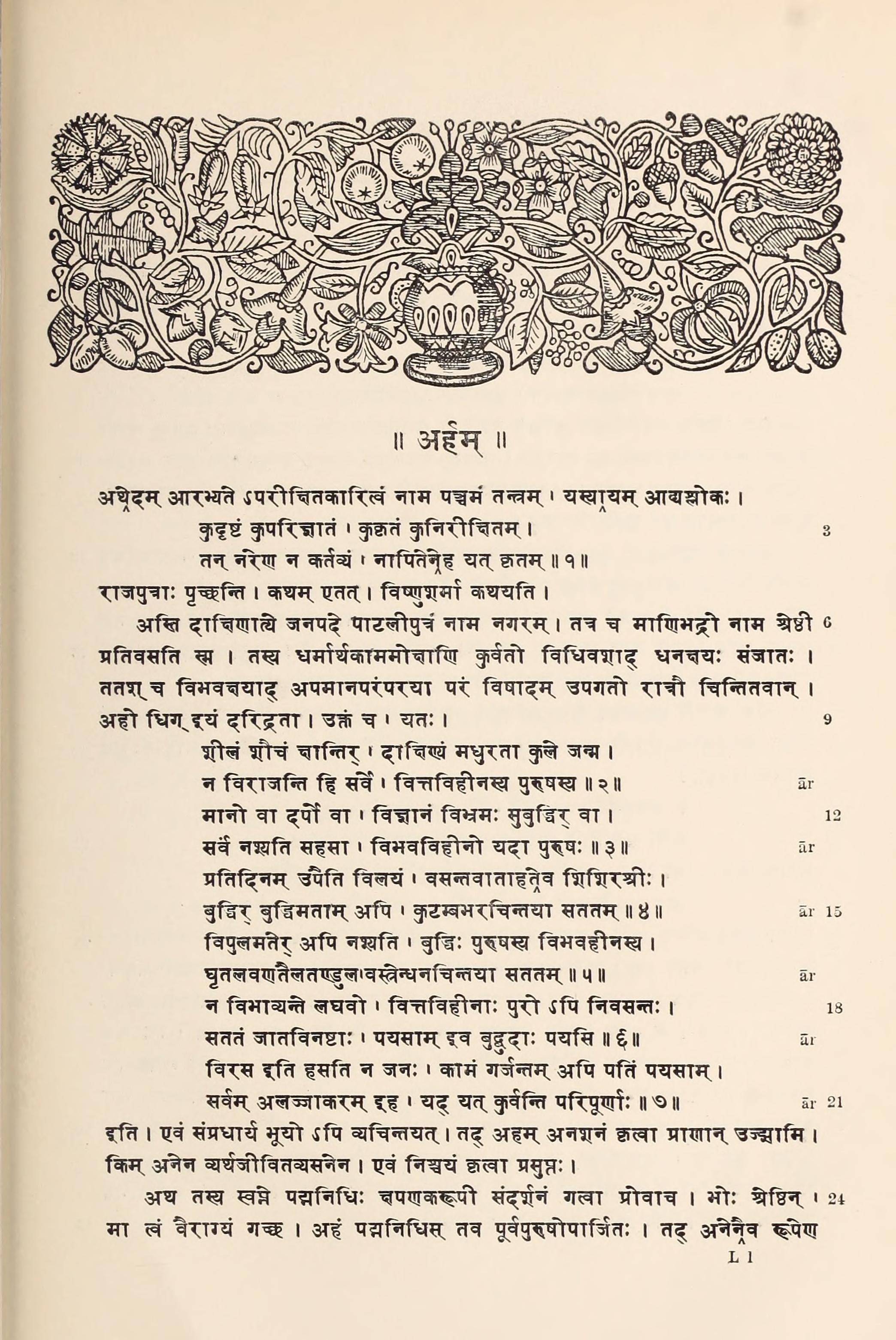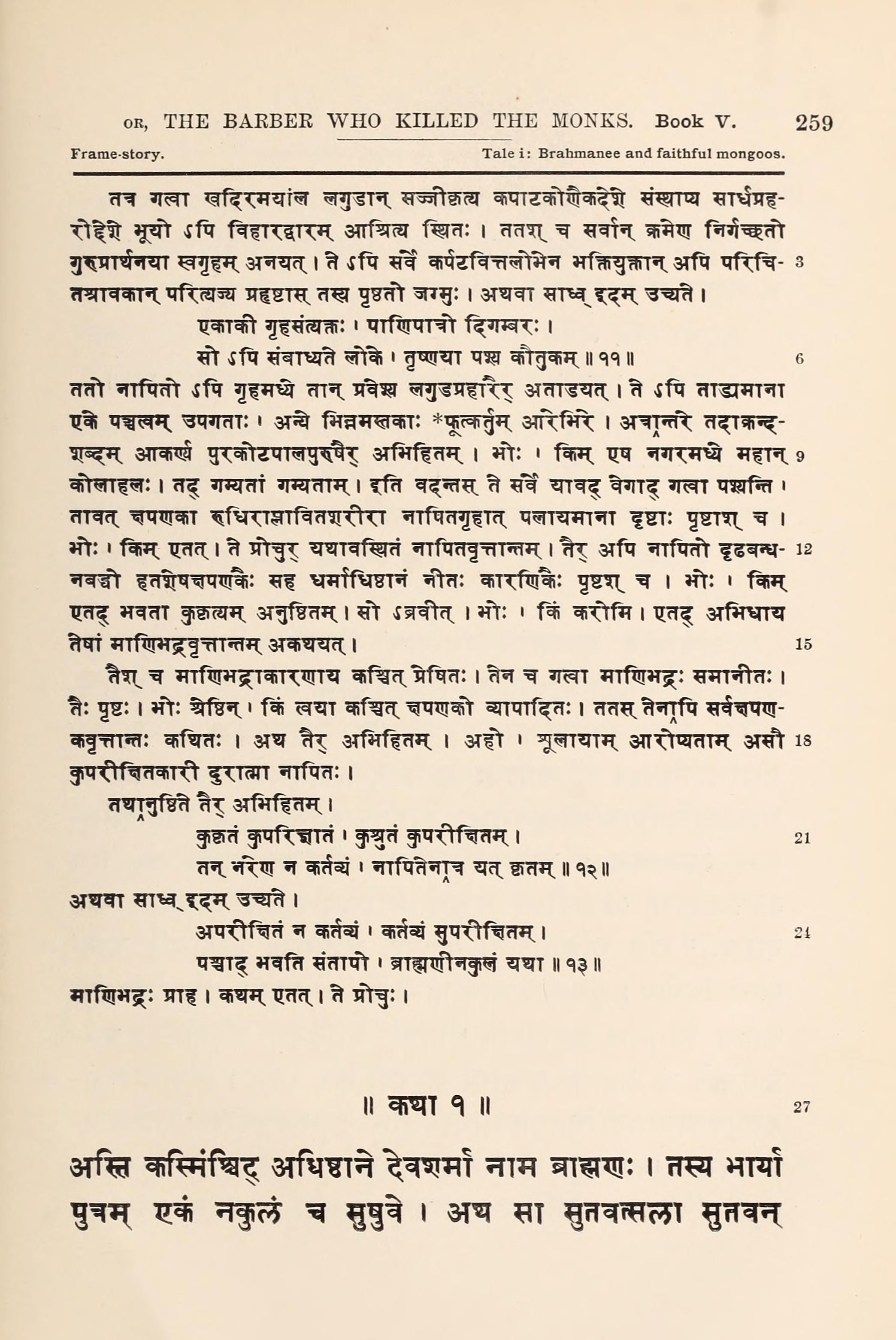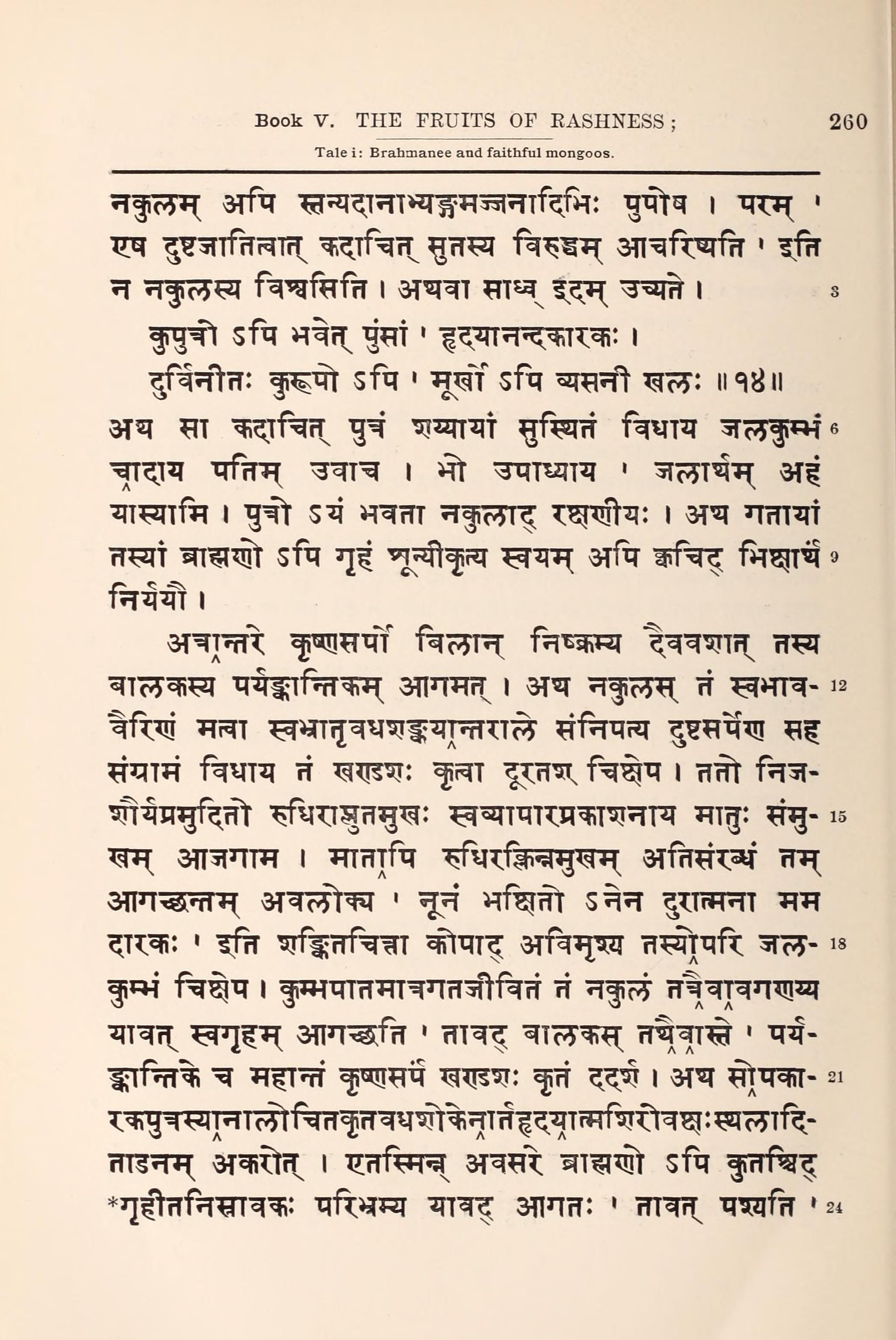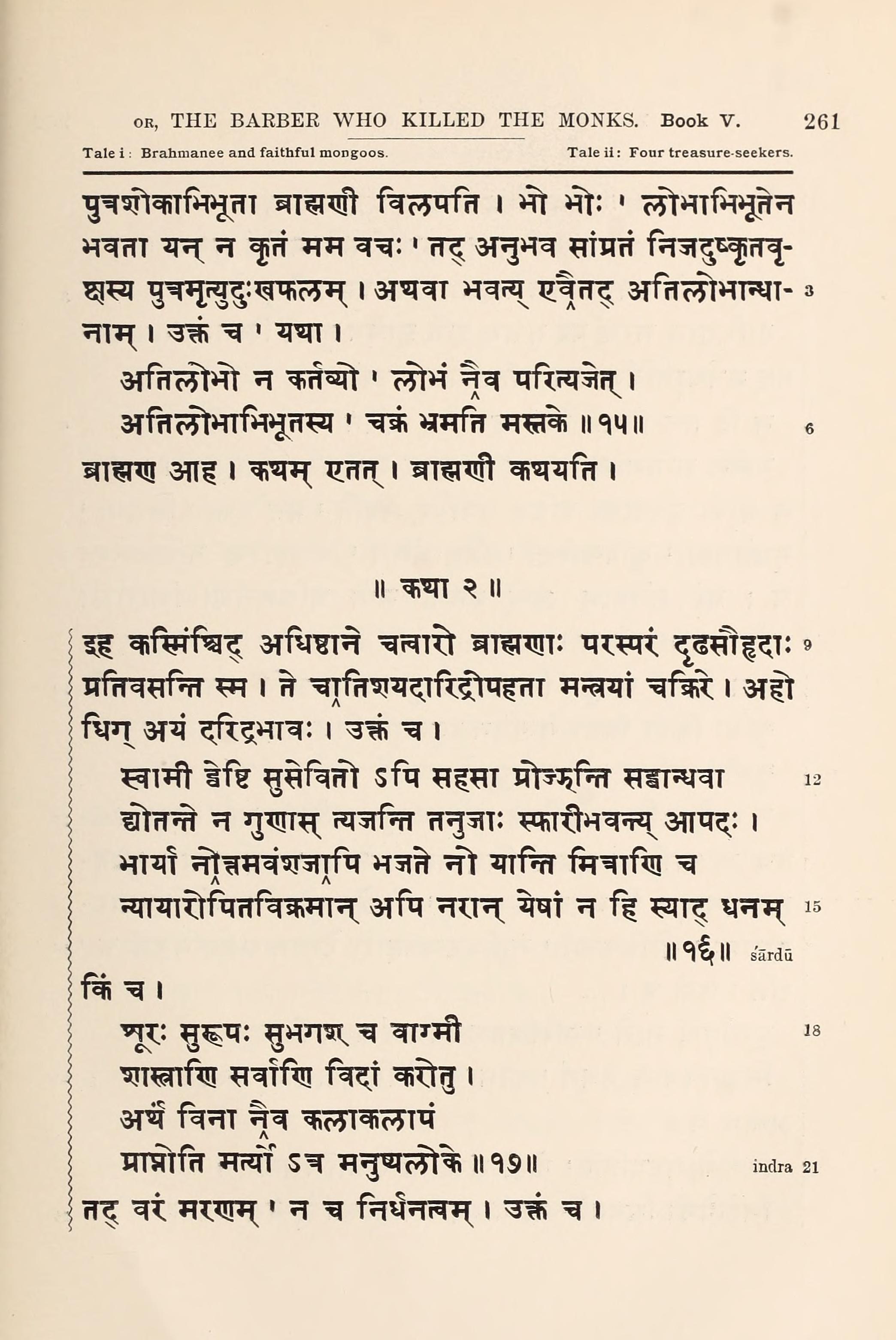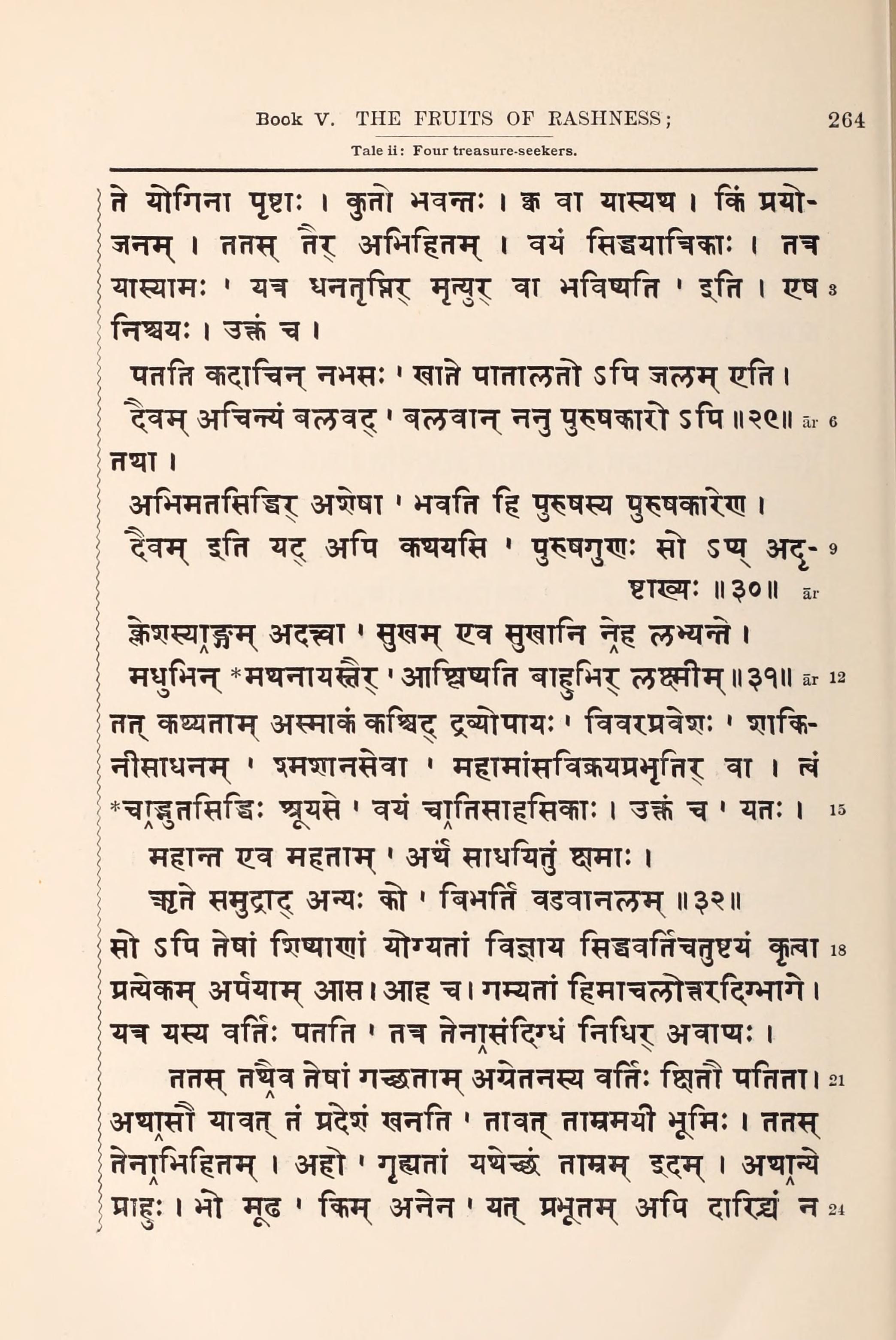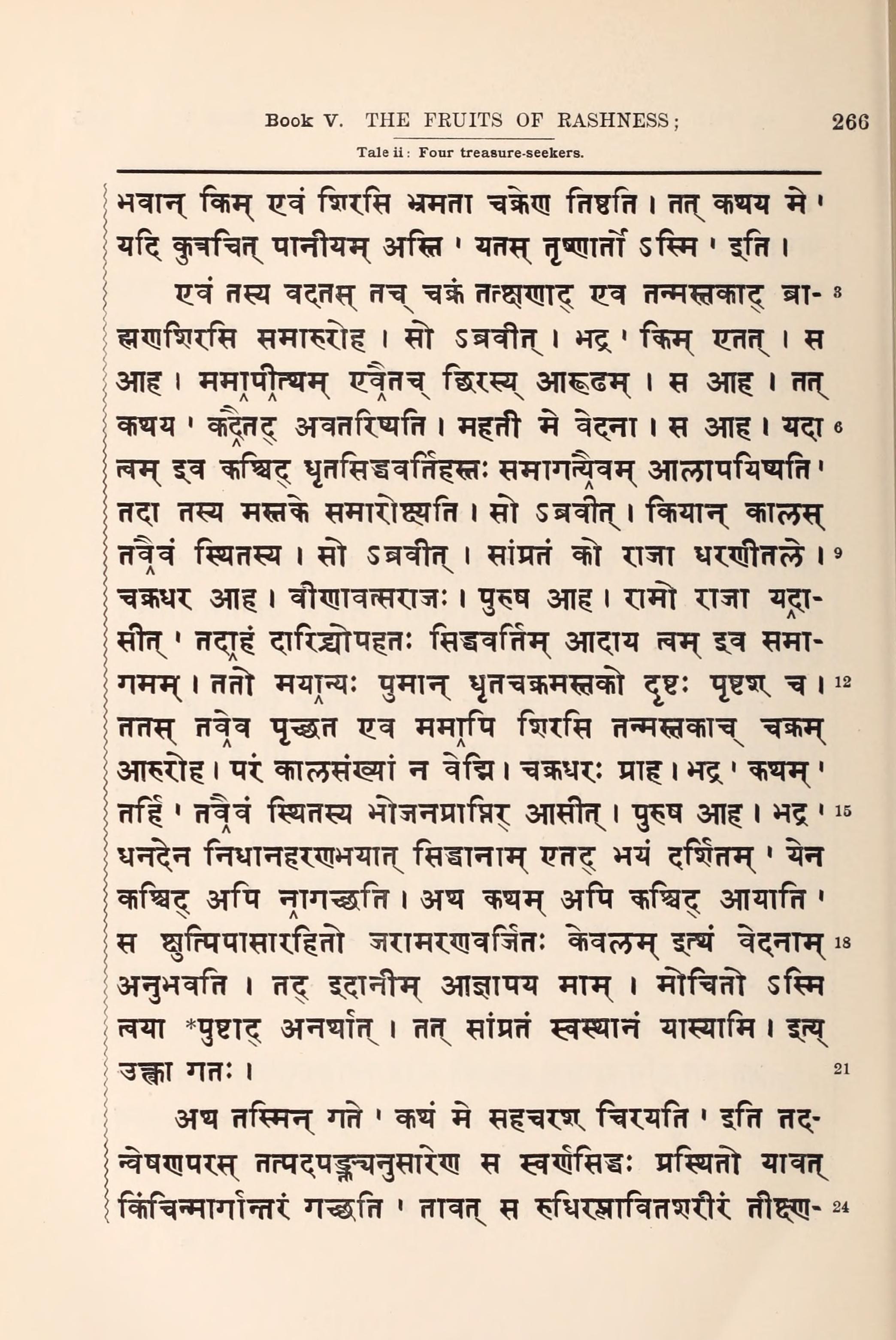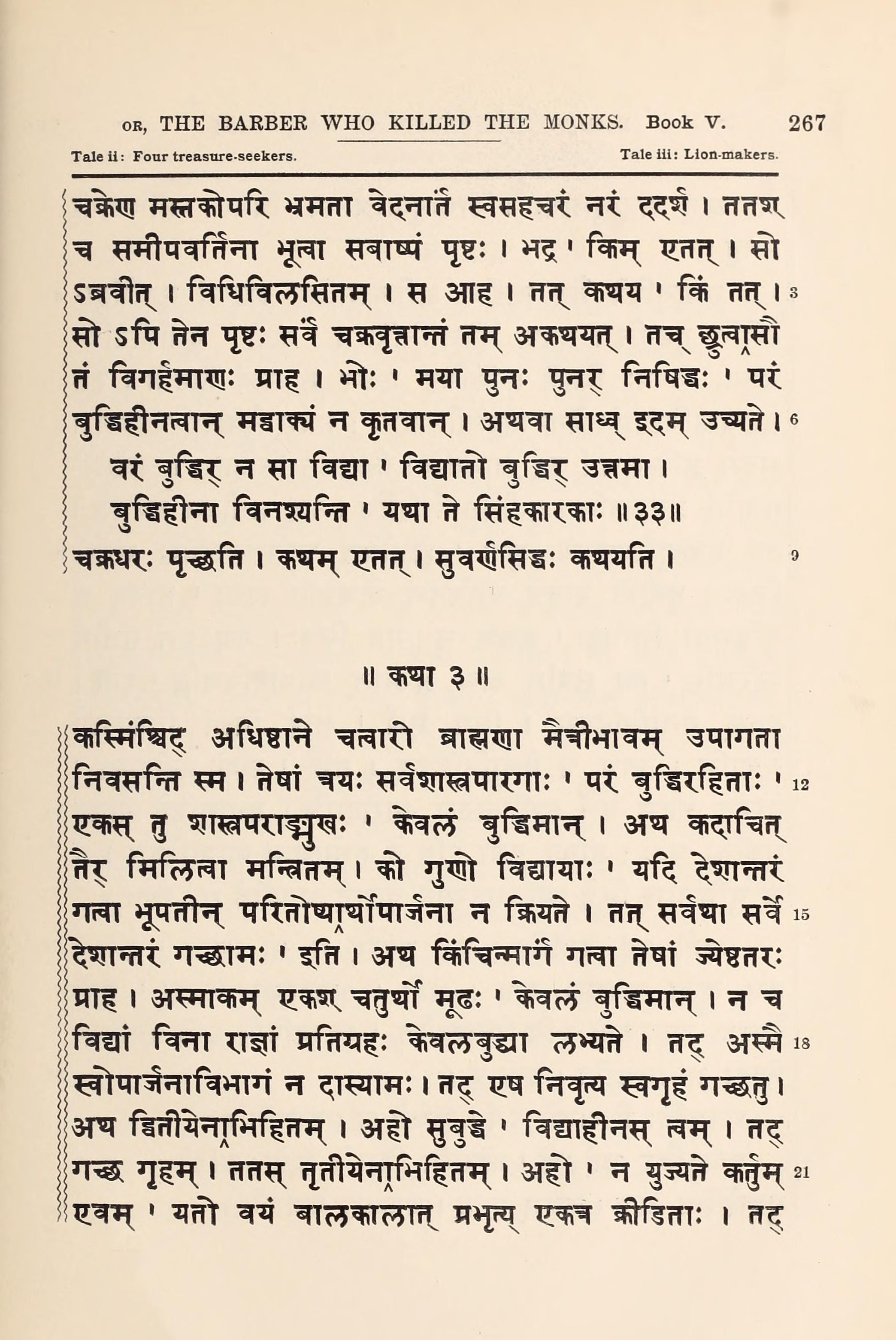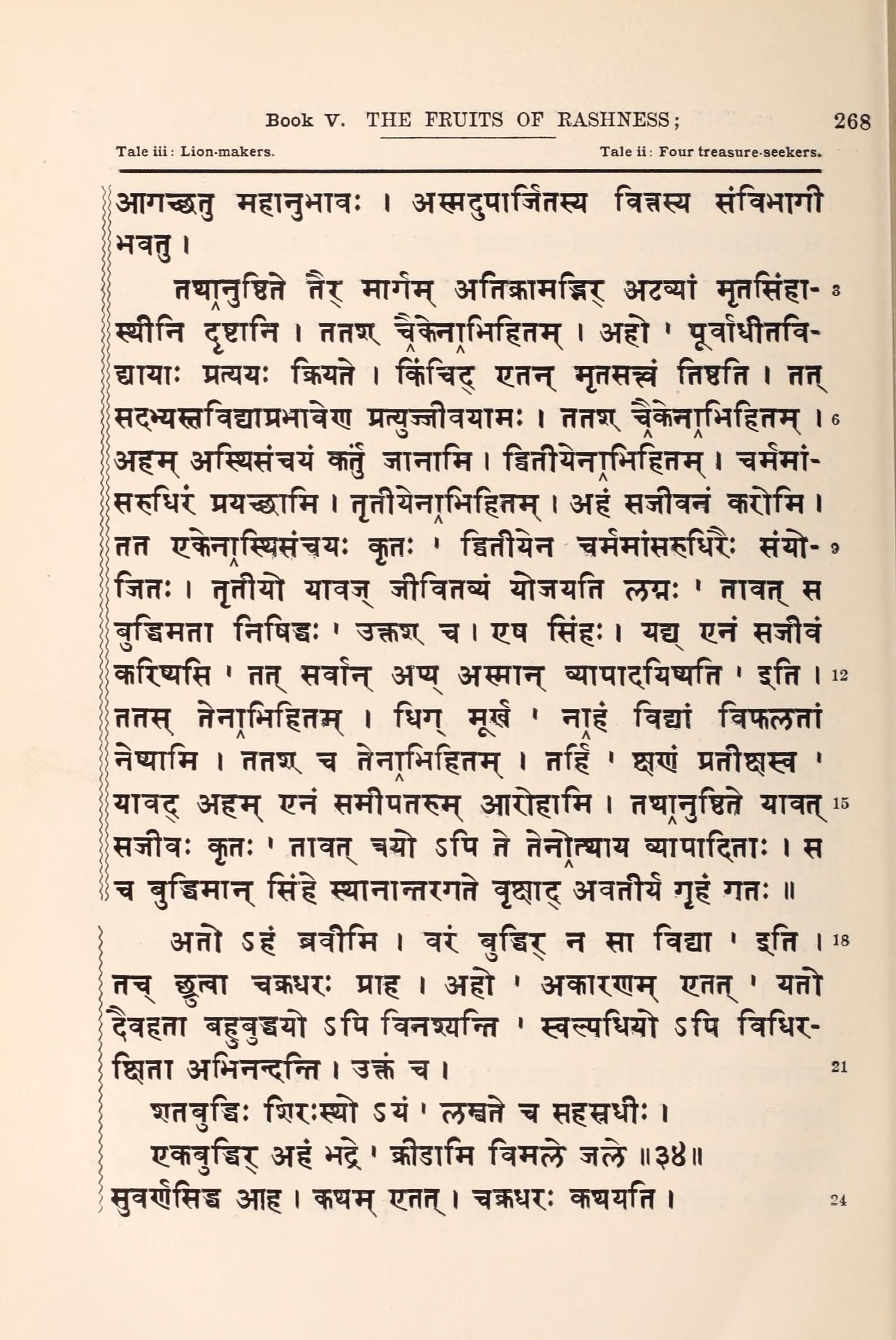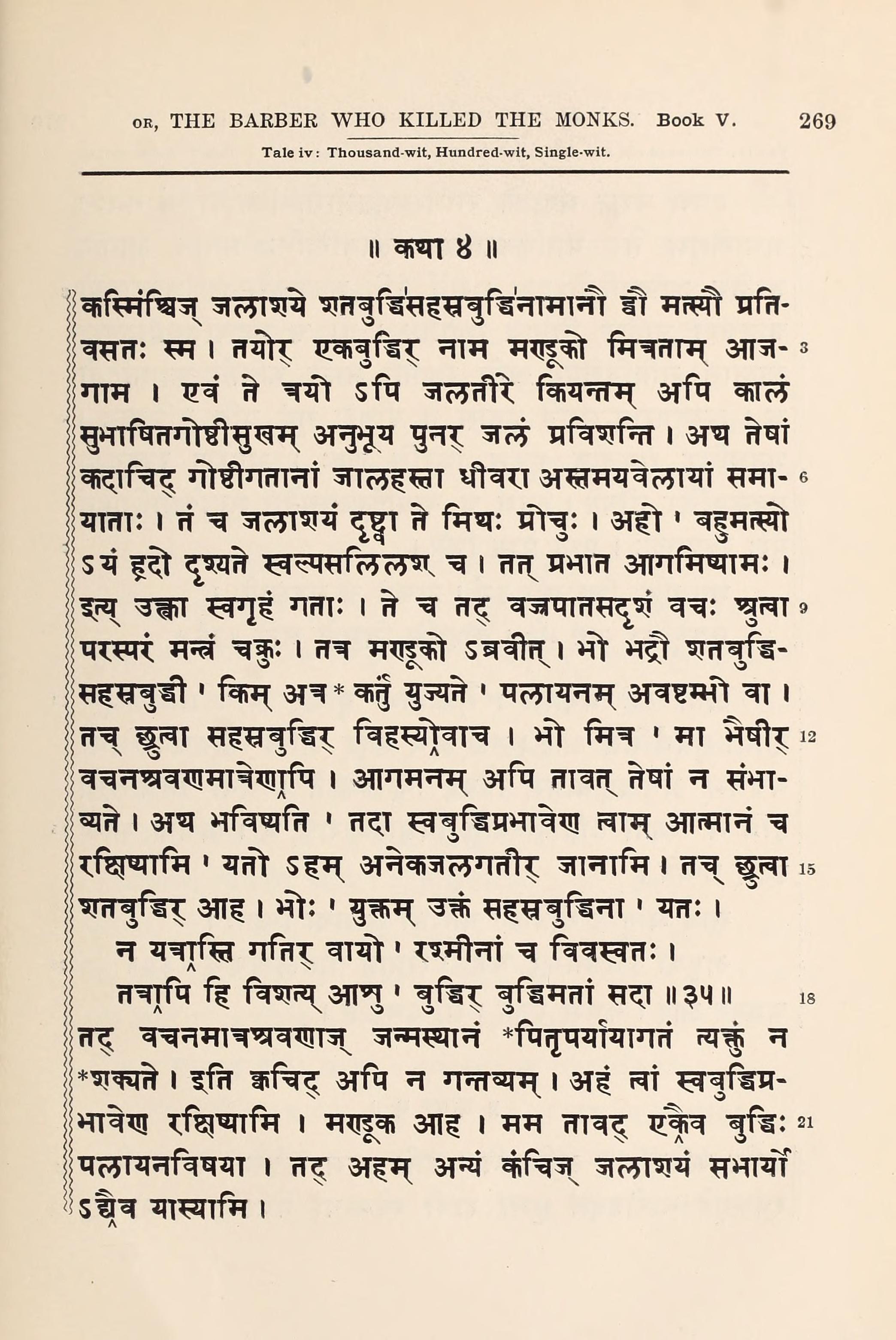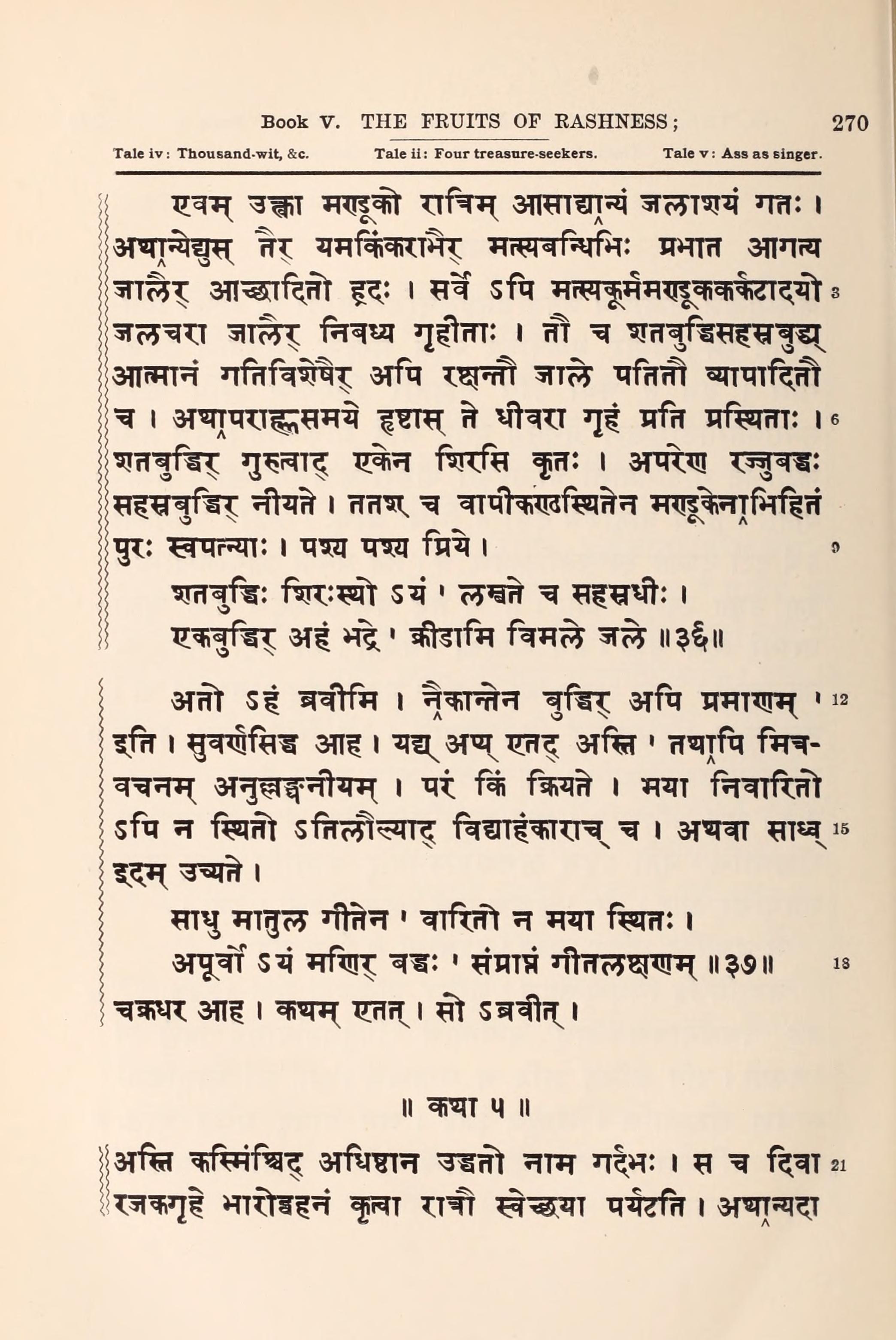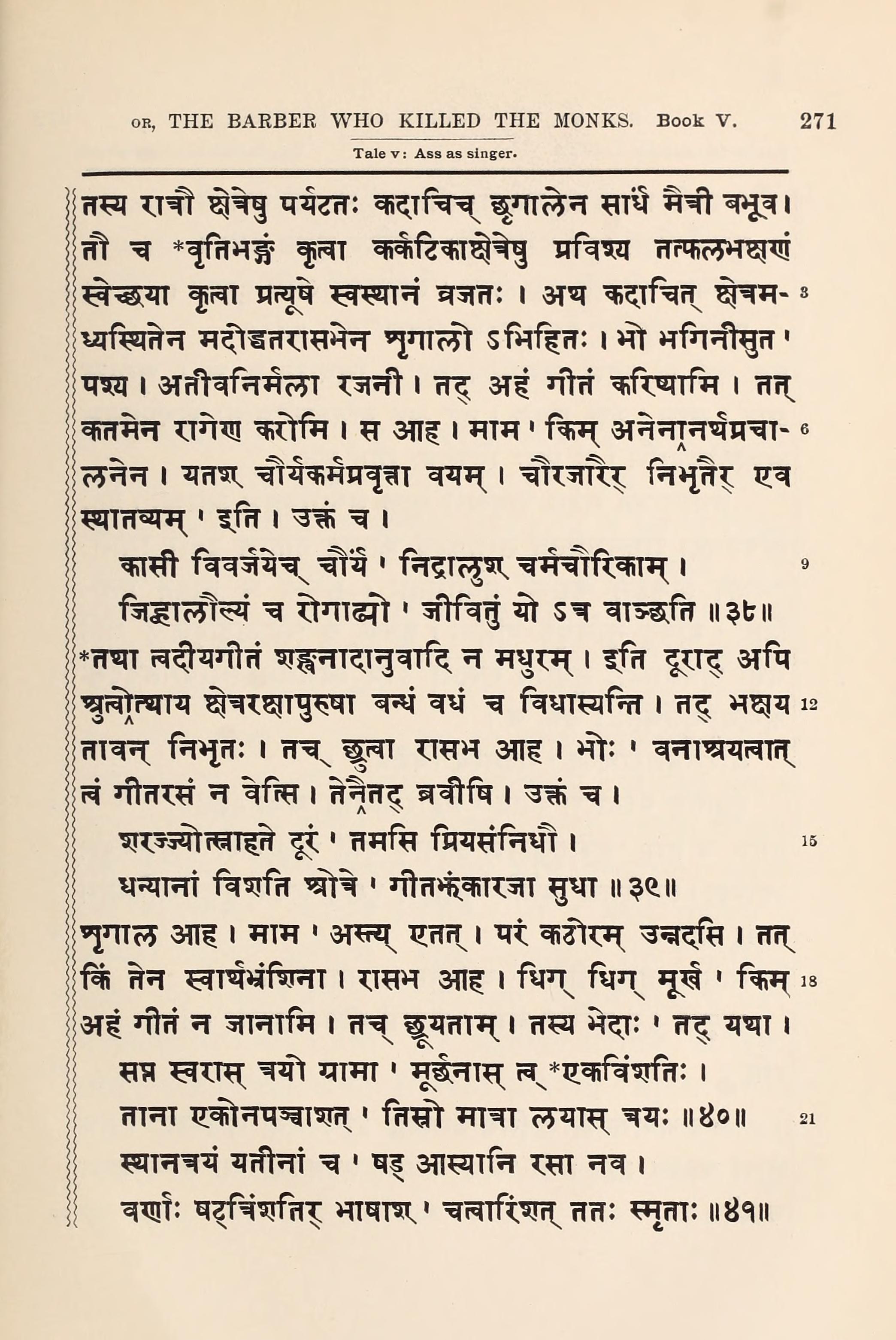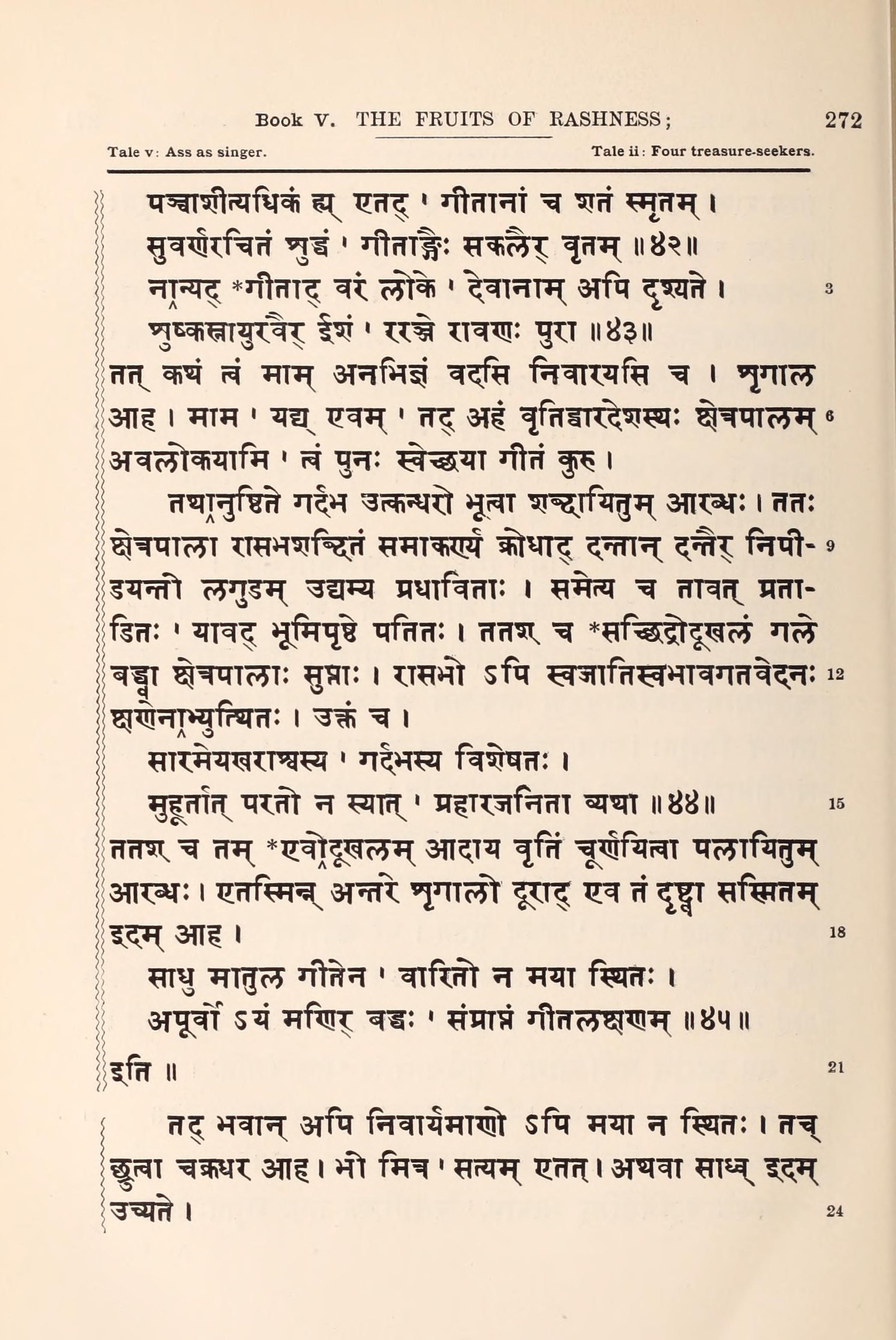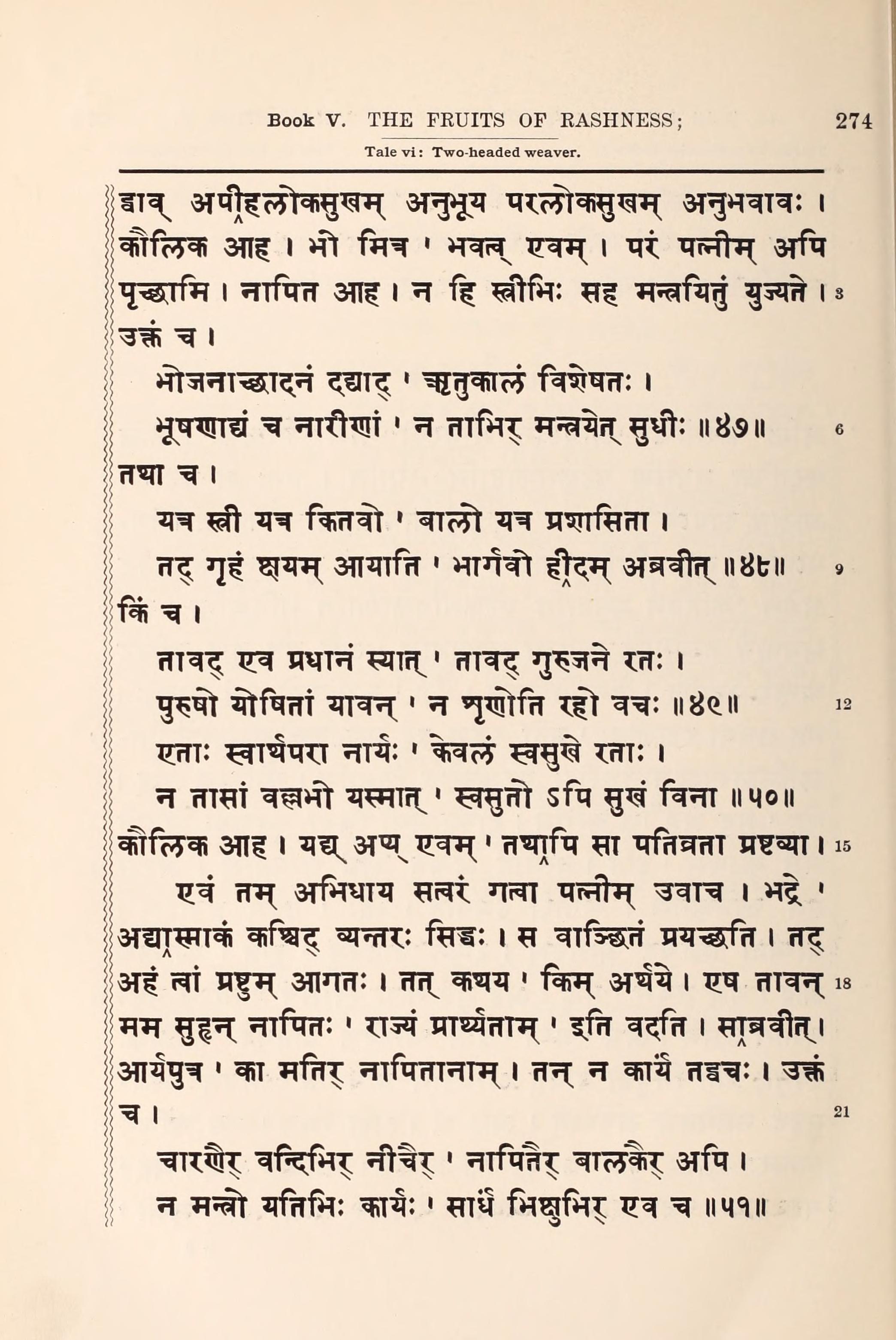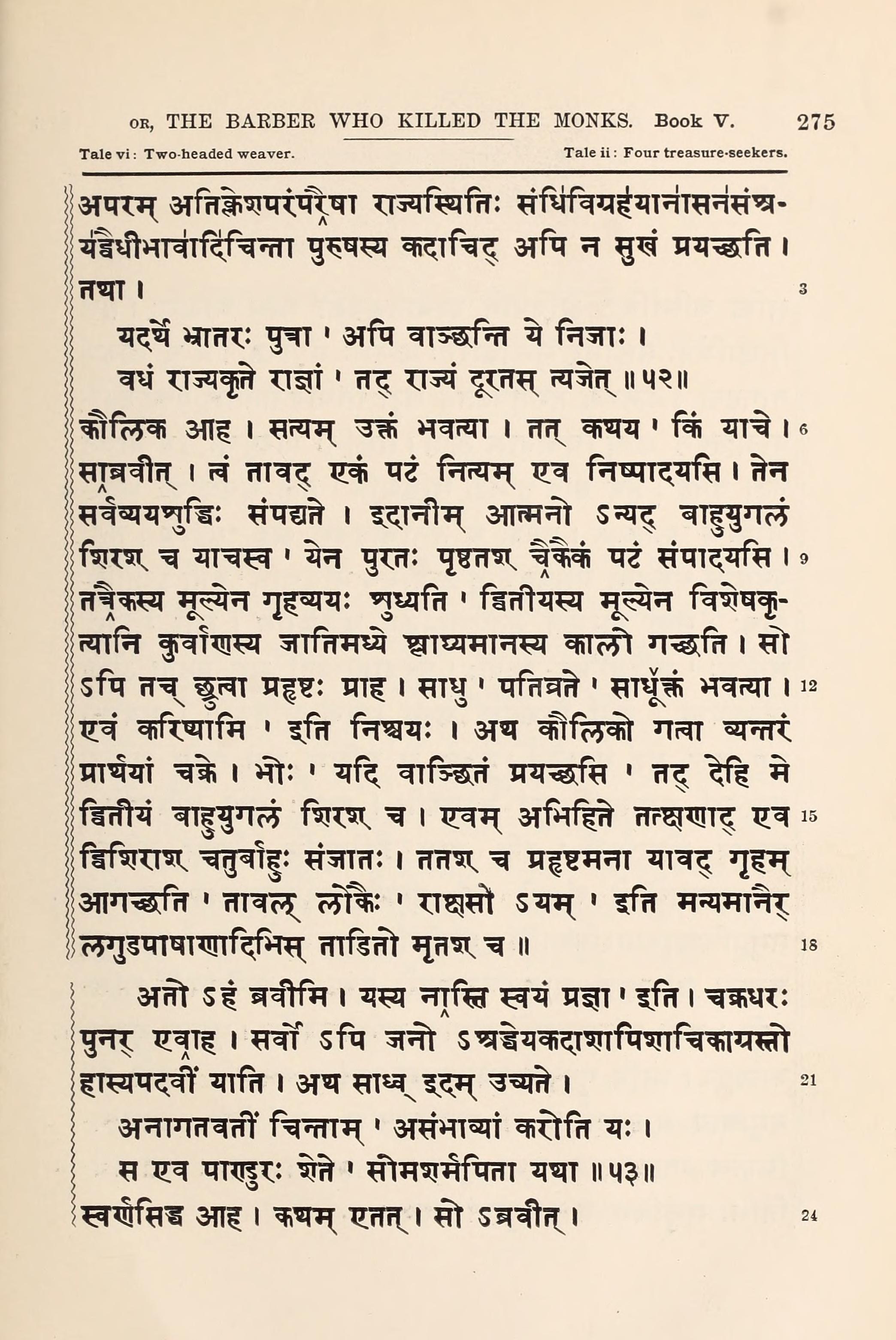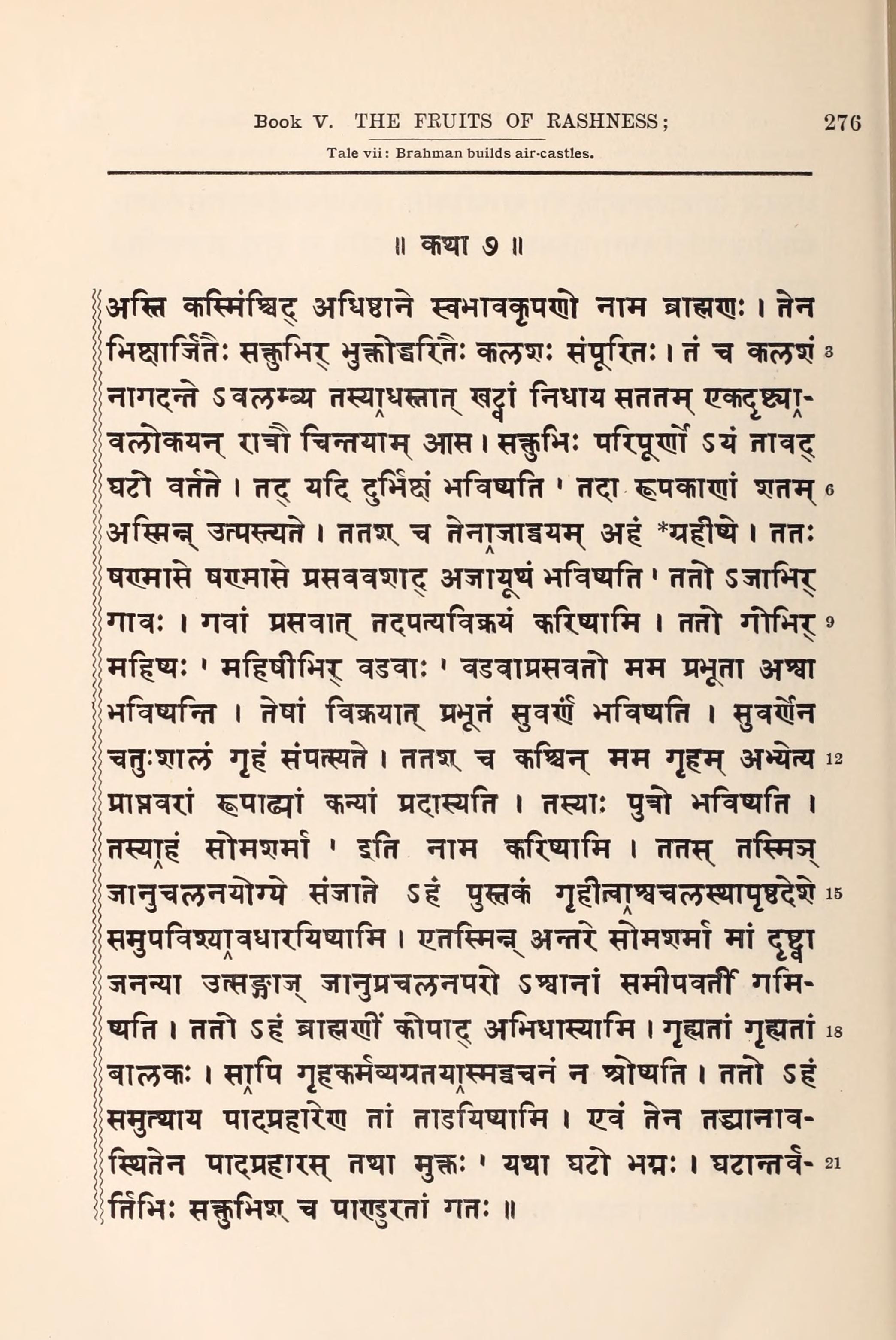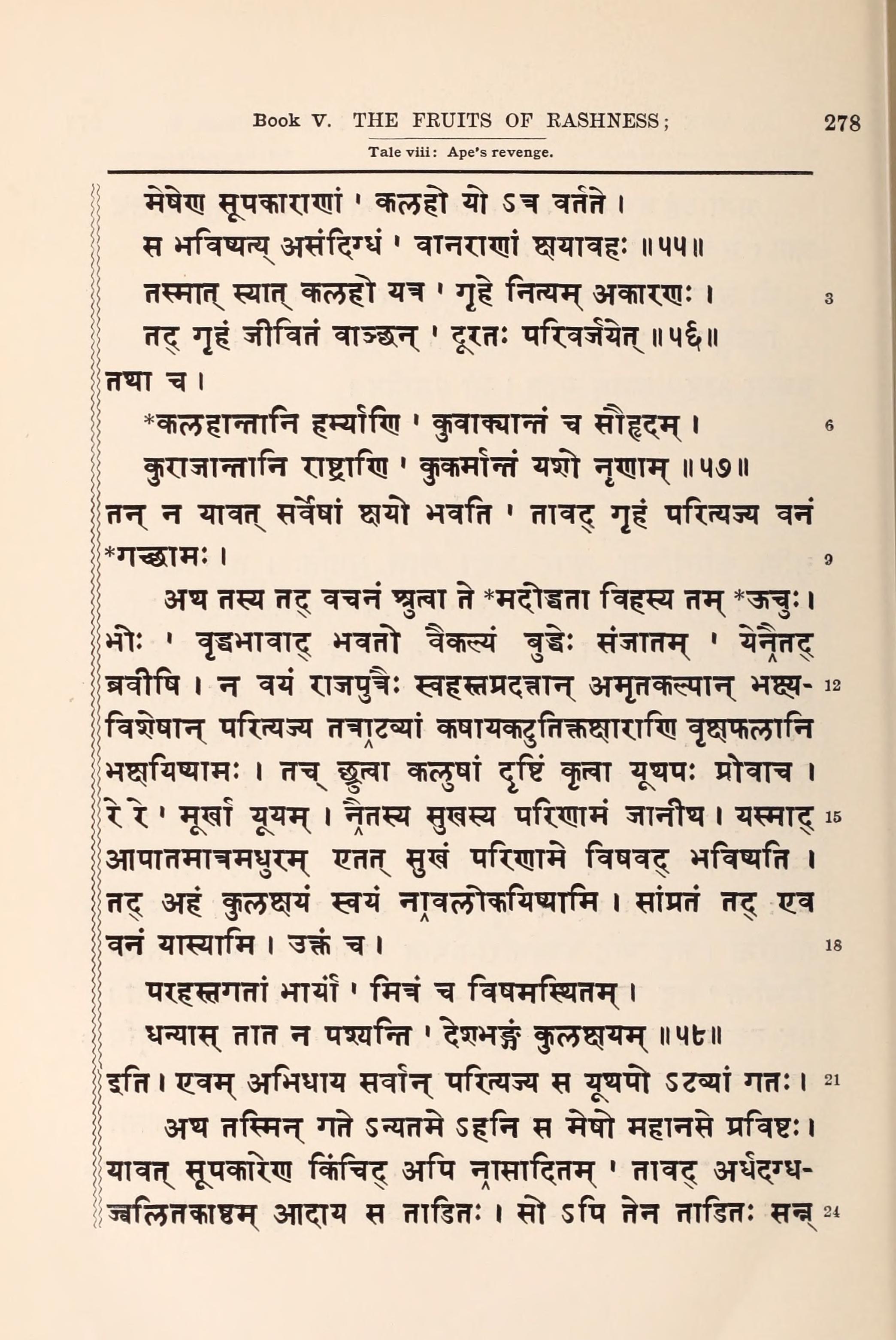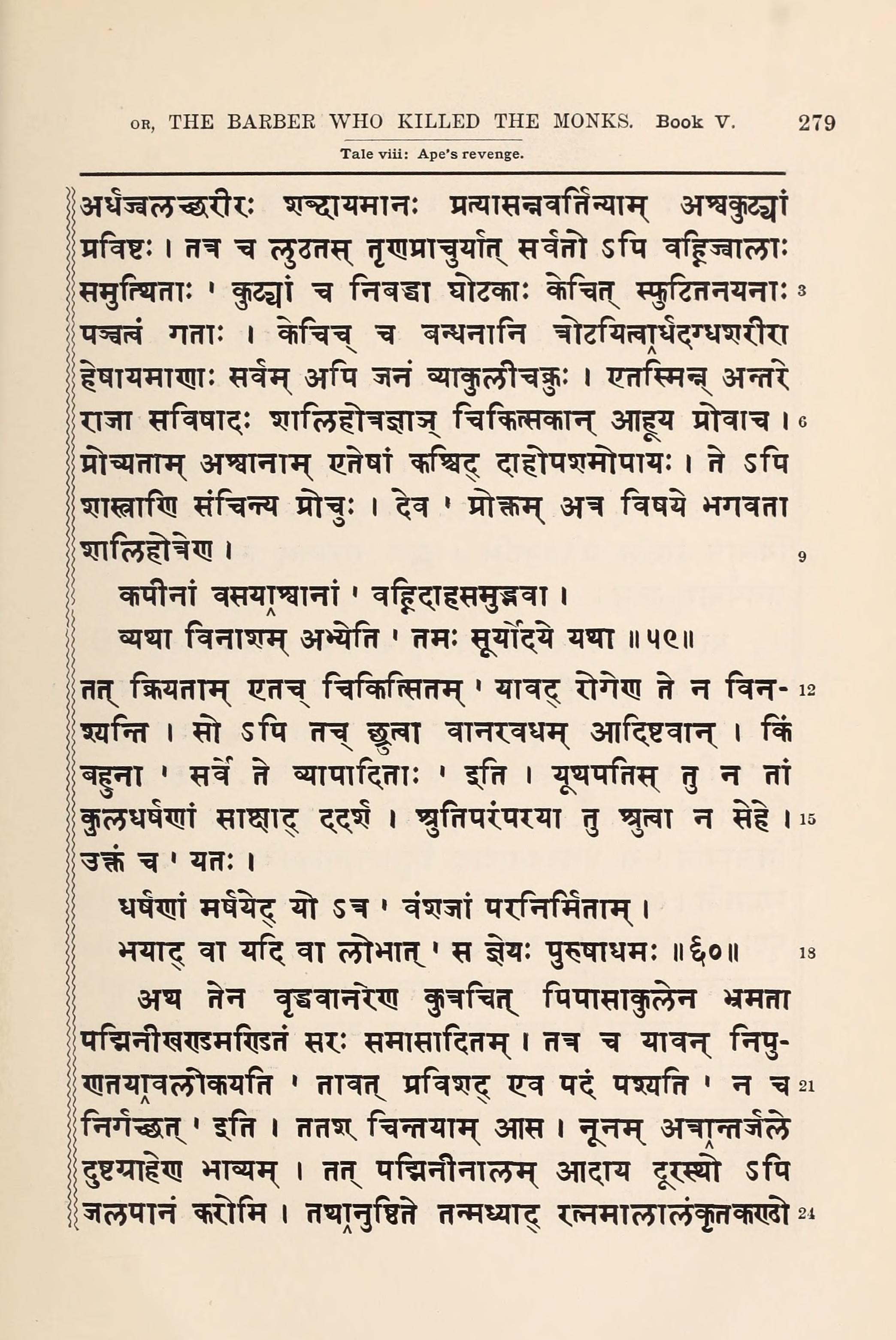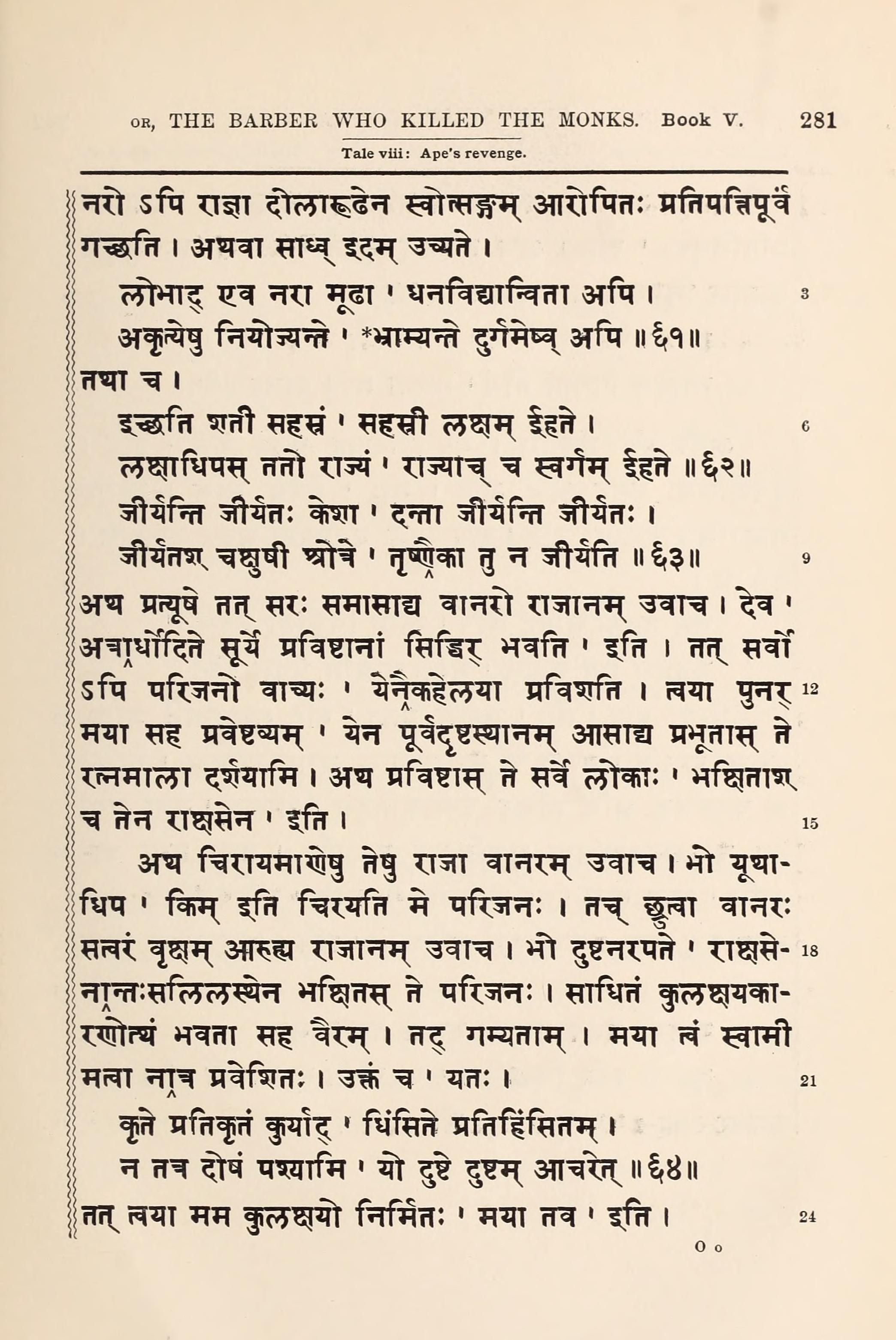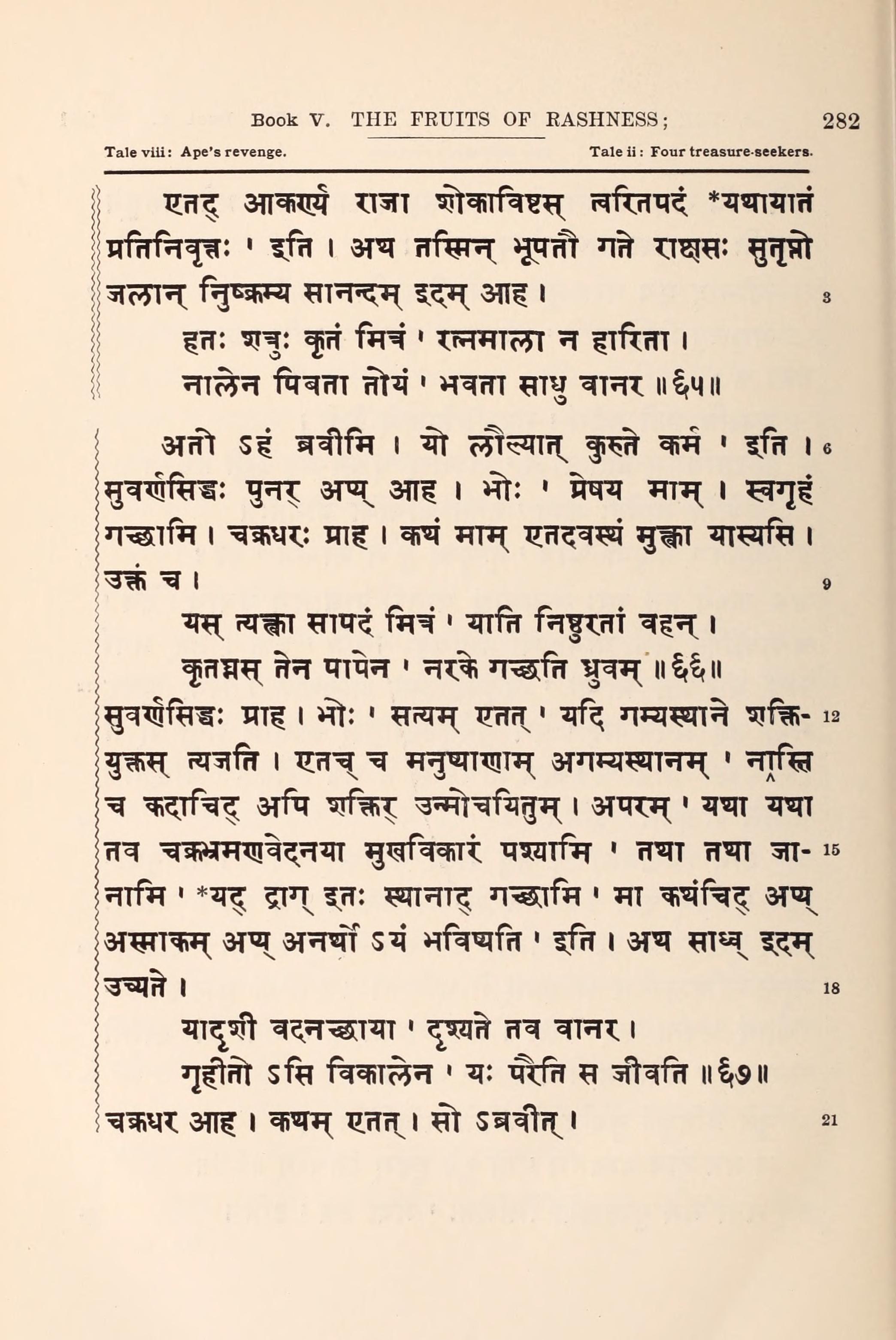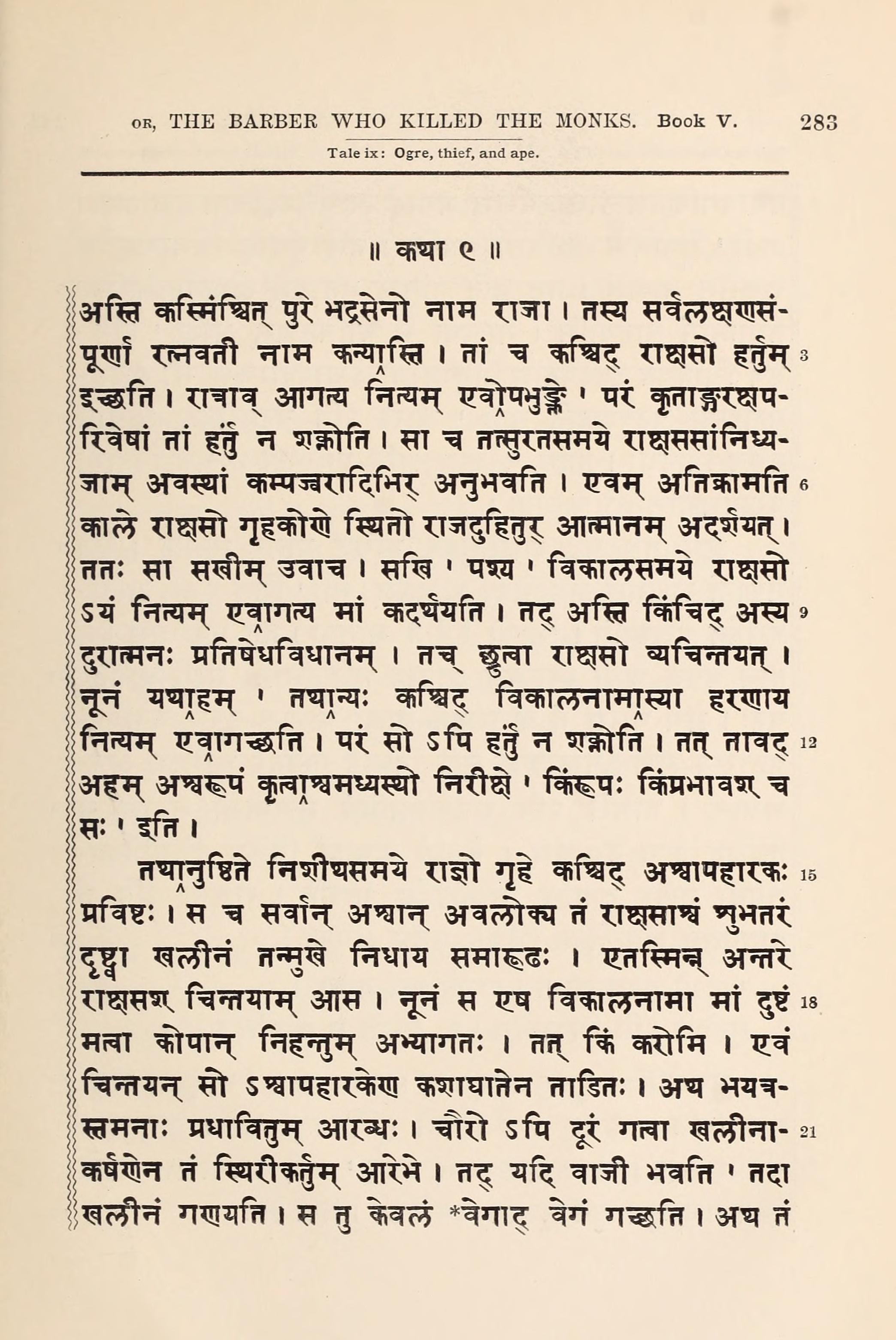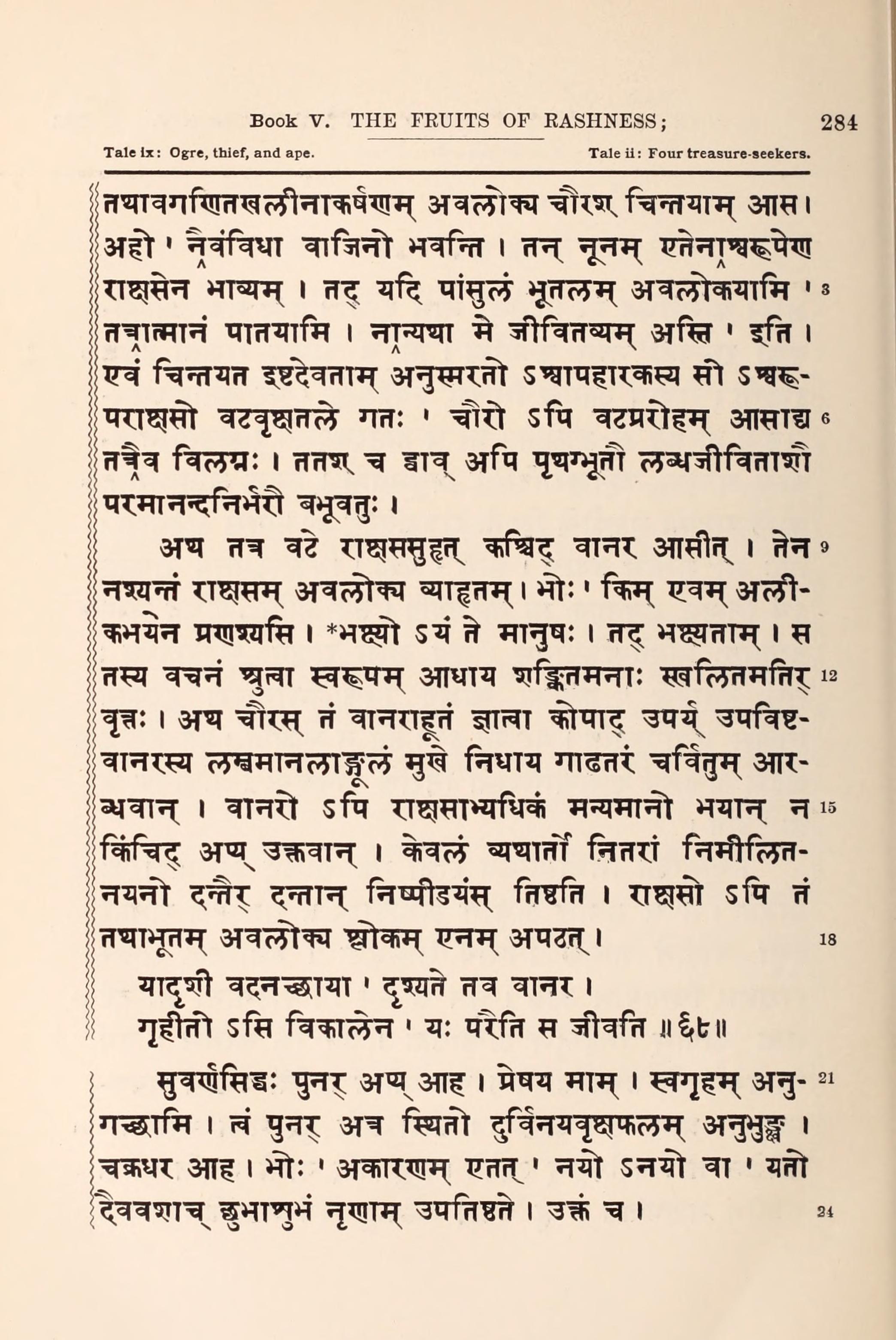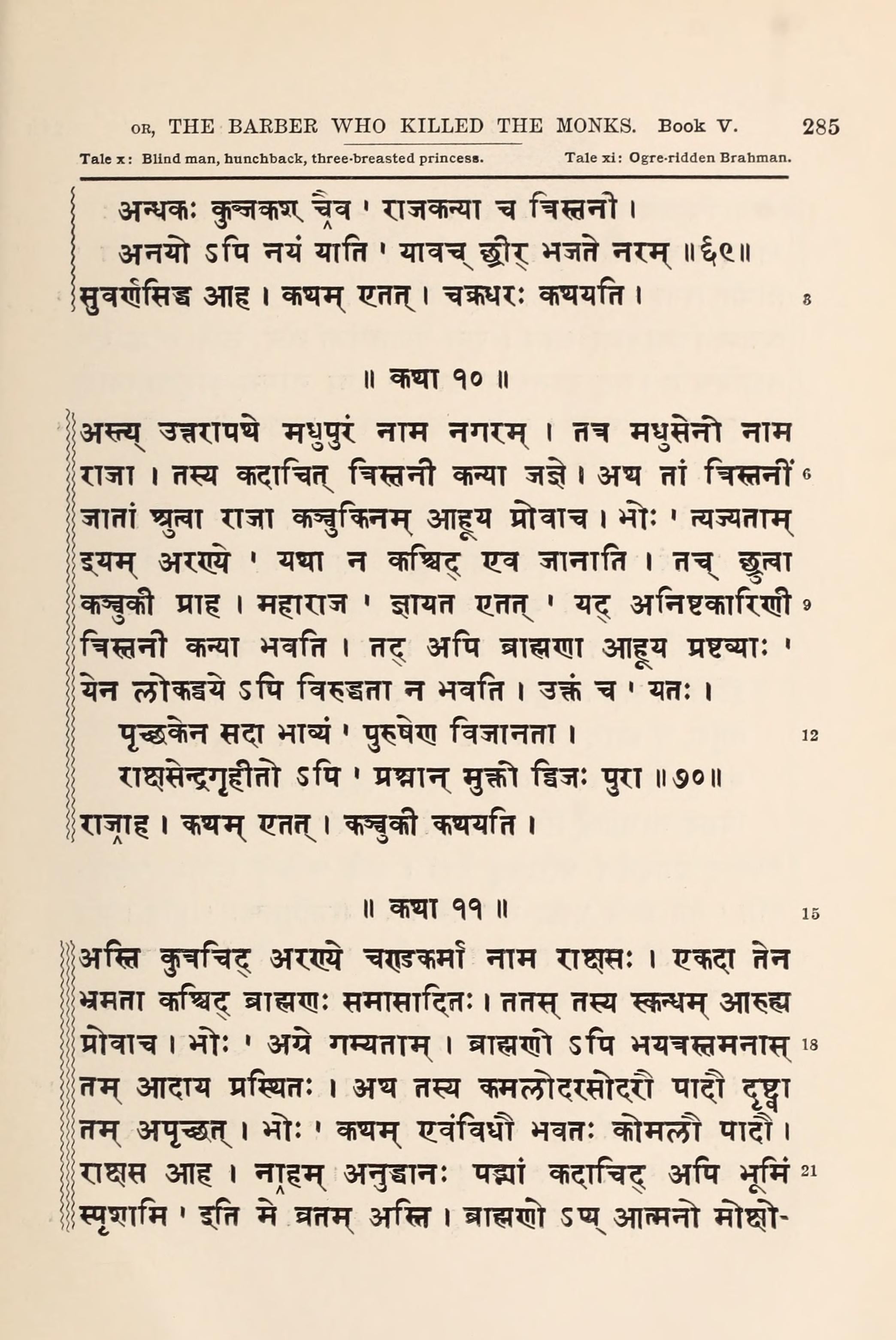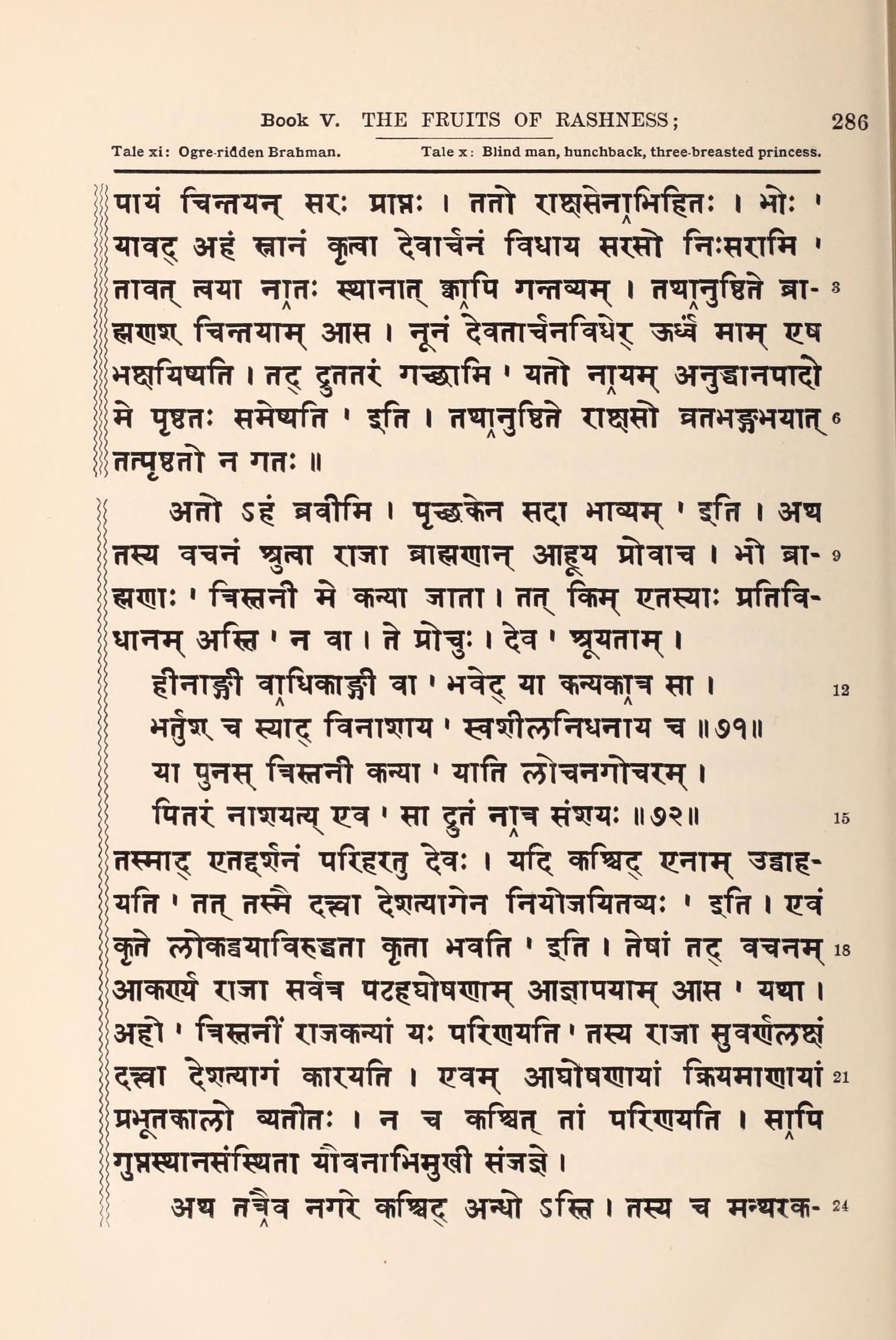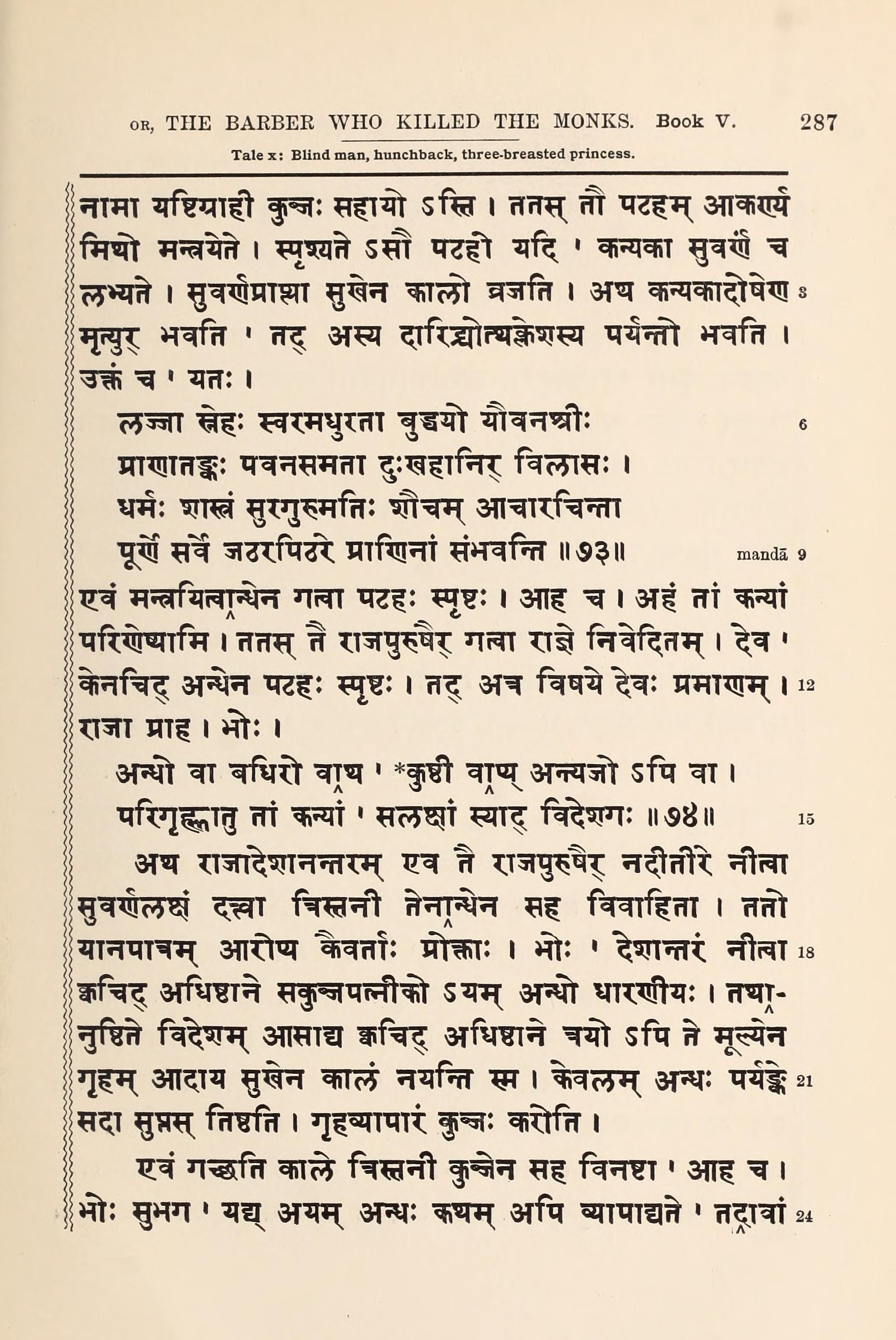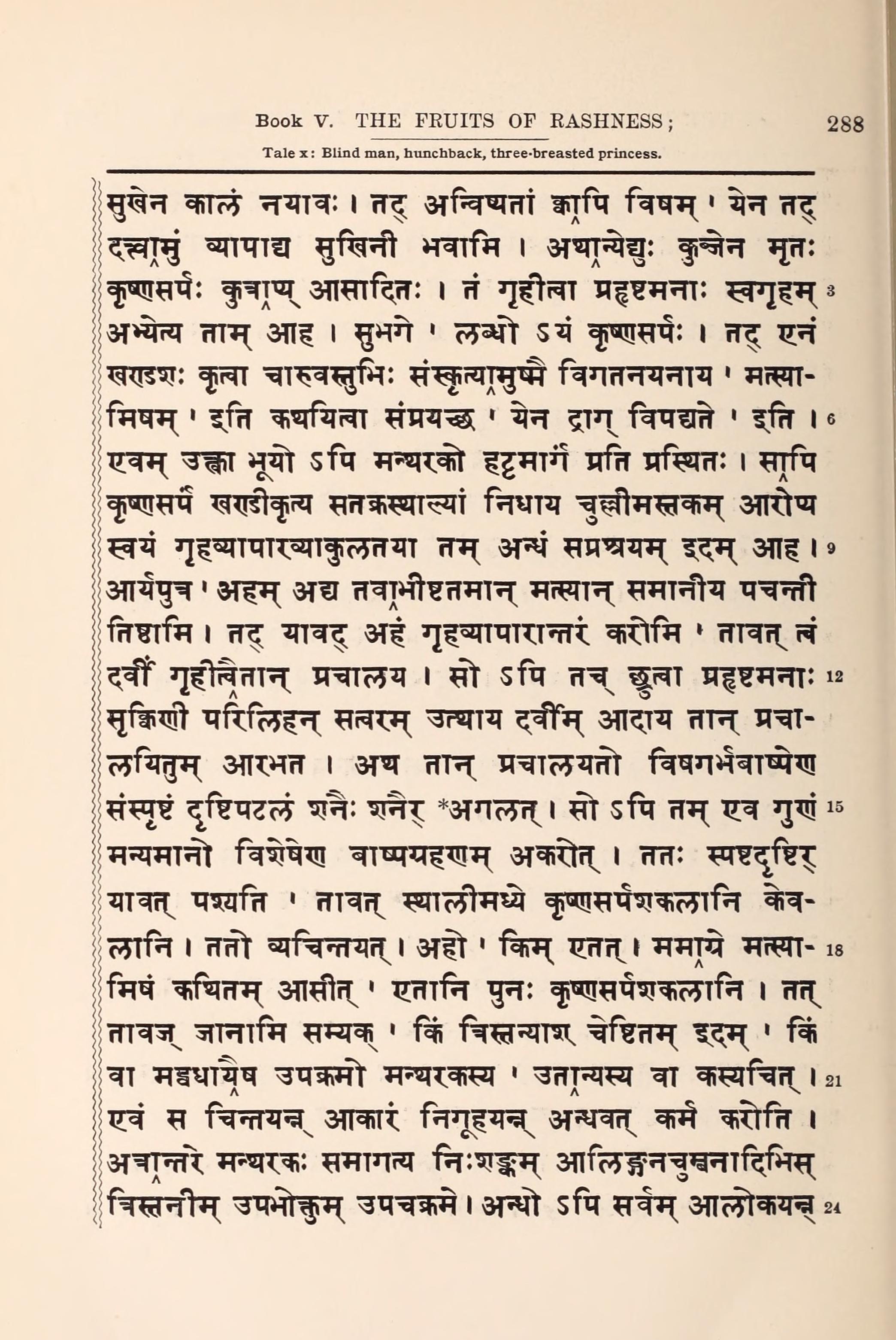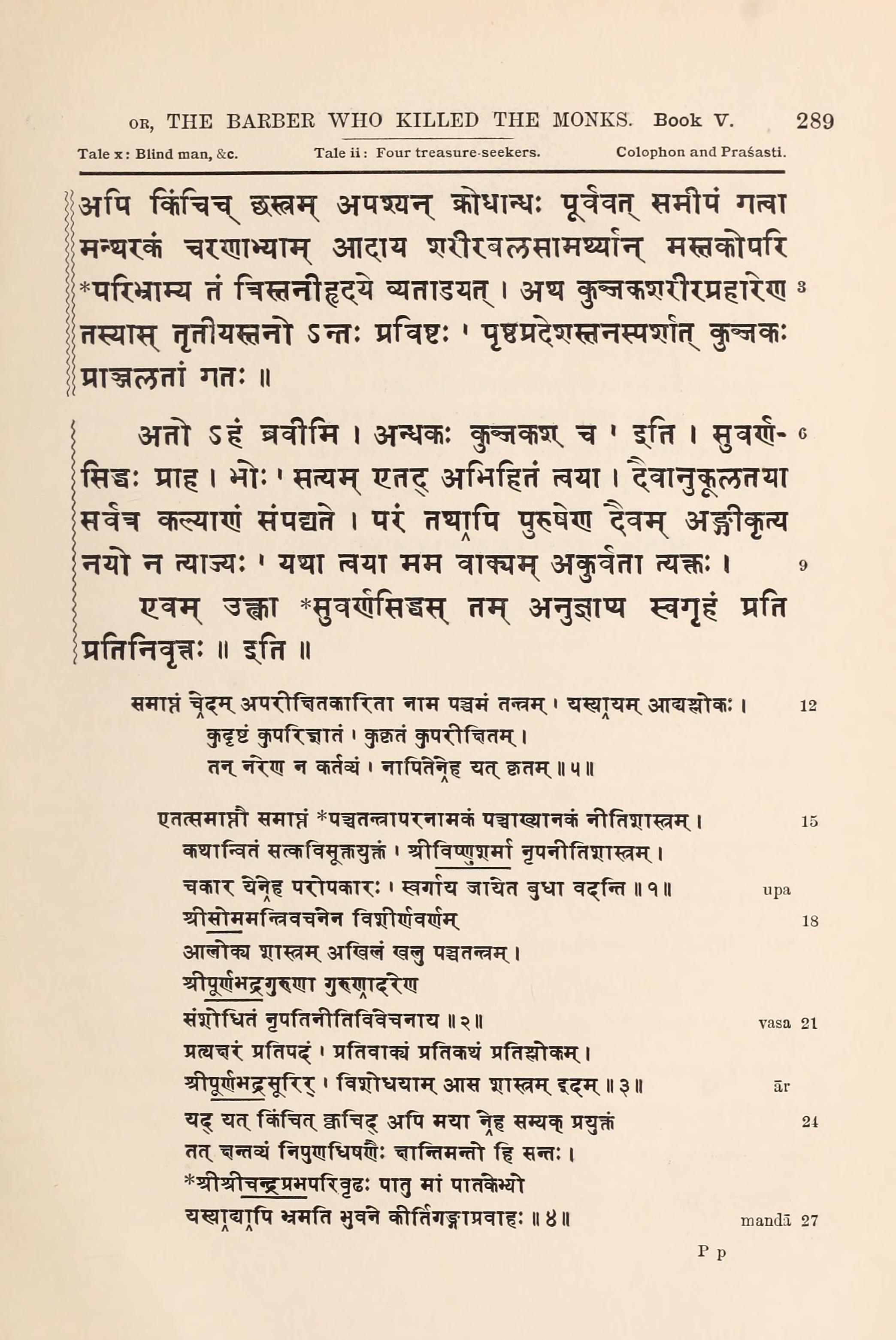Here, then, begins Book V, called “Ill-considered Action.” The first verse runs:
Deeds ill-known, ill-recognized, Ill-accomplished, ill-devised— Thought of these let no man harbor; Take a warning from the barber.
“How was that?” asked the princes. And Vishnusharman told the following story.
In the southern country is a city called Trumpet-Flower. In it lived a merchant named Jewel, who lost his fortune by the decree of fate, though his life was given to the pursuit of virtue, money, love, and salvation. The loss of property led to a series of humiliations, so that he sank into utter despondency. And one night he reflected: “A curse, a curse upon this state of poverty! For the proverb says:
Conduct, patience, purity,
Manners, loving-kindness, birth,
After money disappears,
Cease to have the slightest worth.
Wisdom, sense, and social charm,
Honest pride and self-esteem,
After money disappears,
All at once become a dream.
To the wisdom of the wise
Constant household worries bring
Daily diminution, like
Winter breathed upon by spring.
After money disappears,
Keenest wisdom is at fault,
Choked by daily fuel and clothes,
Oil and butter, rice and salt.
Poor and paltry neighbors scarce
Waken sentiments of scorn,
Like the bubbles on a stream,
Ever dying, ever born.
Yet the rich have license for
All things vulgar and debased:
When the ocean bellows, none
Reprobate his faulty taste.”
Having thus set his mind in order, he concluded: “Under these circumstances, I will abandon life by self-starvation. What can be made of this calamity—life without money?” With his resolve taken, he went to sleep.
Now as he slept, a trillion dollars appeared in the form of a Jain monk, and said: “Good merchant, do not lose interest. I am a trillion, earned by your ancestors. Tomorrow morning I
will come to your house in this same form. Then you must club me on the head, so that I may turn to gold and prove inexhaustible.”
On awaking in the morning, he spent some time pondering on his dream: “Let me think. Will this dream prove true or false? I cannot tell. No doubt it will prove false, for I think of nothing but money all day and all night. And the proverb says:
Dreams that do not mean a thing Come to sick and sorrowing, Lovelorn, drunk, and worrying.”
At this moment a barber arrived to manicure his wife’s nails. And while the barber was busy with his manicuring, the Jain monk suddenly appeared. When Jewel perceived the monk, he was delighted and struck him on the head with a stick of wood that lay handy. Whereupon the monk turned to gold and immediately fell to the ground.
The merchant then set him up in the middle of the house, and said to the barber, after handing him a tip: “My good fellow, you must not tell anybody what has happened in our house.” To this the barber assented, but when he reached home, he thought: “Surely, all these naked fellows turn to gold when clubbed on the head. So tomorrow morning I, too, will invite a lot of them and club them to death, in order to get a lot of gold.” And the day and the night dragged away as he meditated his plan.
In the morning he rose and went to a Jain monastery, arranged his upper garment, circumambulated the Conqueror thrice, sought the ground with his knees, laid his garment’s hem over the gateway of his mouth, made a profound obeisance, and with an earpiercing voice intoned the following hymn:
“The saints victorious endure Who live by saving knowledge pure, Who sterilize the mind within By mind, against the seed of sin.
And further:
The tongue that praiseth Him is blest; The heart, in Him that seeketh rest; The hands are blest, and only they, That e'er to Him due homage pay.”
After chanting other hymns also to the same effect, but in great variety, he sought out the abbot and dropped on his knees and hands, saying: “Greetings, Your Reverence.” From the abbot he received a benediction for the increase of his virtue, likewise instructions for a vow that involved the practice of celibacy. Then he said devoutly: “Holy sir, when you take your pious walk today, pray come to my house with your whole company of monks.”
“My dear neophyte,” replied the abbot, “you know the holy law. How can you speak so? Do you take us for Brahmans, that you invite us to eat? Nay, we wander each day just as it happens, and when we meet a pious neophyte, enter his house. Begone. Never speak so again.”
“Holy sir,” said the barber, “I know it well. I will do as you say. However, you have many neophytes engaged in pious labors; while I, for my part, have made ready strips of canvas adapted to the wrapping of manuscripts. And for the copying of manuscripts and the payment of scribes, sufficient money is provided. In view of this, pray do what seems proper.” And so he started home.
When he arrived there, he got ready cudgels of acacia wood, placed them in a corner behind the door, then toward noon he returned to the monastery gate and waited there. Then as they all came forth in order of dignity, he besought them as teachers, and led them to his house. For their part, in their greed for book-covers and money they passed by their familiar neophytes, even the pious ones, and joyfully flocked behind him. Well, there is sense in the verse:
Behold a wonder! Even he Who lives alone, from kindred free, With hand for spoon, and air for dress, Is overcome by greediness.
Then the barber conducted them well into the house and clubbed them. Under the clubbing some died, others had their heads broken and began to bawl. But when the soldiers in the citadel heard the howling, they said: “Well, well! What is this tremendous hubbub in the middle of town? Come along!” So they all scampered and saw the monks rushing from the barber’s house, blood streaming over their bodies. And being asked what it meant, they told exactly how the barber had behaved.
So the soldiers fettered the barber and carried him off to court together with such monks as had survived the slaughter. There the judges questioned him: “Come, sir! What means this shameful deed by you committed?” And he replied: “Gentlemen, what else could I do?” And with this he related the behavior of Jewel.
The judges therefore despatched a summonser, who returned with Jewel. And they questioned him: “Merchant, why did you kill a certain Jain monk?” And he in turn gave a full account of the original monk. Whereupon they said: “Well, well! Let this villainous barber be impaled. For his act was ill advised.”
When this had been done, they observed:
Deeds ill-known, ill-recognized, Ill-accomplished, ill-advised— Thought of these let no man harbor; Take a warning from the barber.
And there is sound sense in this:
Let the well-advised be done; Ill-advised leave unbegun: Else, remorse will be let loose, As with lady and mungoose.
“How was that?” asked Jewel. And they told the story of
The Loyal Mungoose
There was once a Brahman named Godly in a certain town. His wife mothered a single son and a mungoose. And as she
loved little ones, she cared for the mungoose also like a son, giving him milk from her breast, and salves, and baths, and so on. But she did not trust him, for she thought: “A mungoose is a nasty kind of creature. He might hurt my boy.” Yes, there is sense in the proverb:
A son will ever bring delight. Though bent on folly, passion, spite, Though shabby, naughty, and a fright.
One day she tucked her son in bed, took a waterjar, and said to her husband: “Now, Professor, I am going for water. You must protect the boy from the mungoose.” But when she was gone, the Brahman went off somewhere himself to beg food, leaving the house empty.
While he was gone, a black snake issued from his hole and, as fate would have it, crawled toward the baby’s cradle. But the mungoose, feeling him to be a natural enemy, and fearing for the life of his baby brother, fell upon the vicious serpent halfway, joined battle with him, tore him to bits, and tossed the pieces far and wide. Then, delighted with his own heroism, he ran, blood trickling from his mouth, to meet the mother; for he wished to show what he had done.
But when the mother saw him coming, saw his bloody mouth and his excitement, she feared that the villain must have eaten her baby boy, and without thinking twice, she angrily dropped the water-jar upon him, which killed him the moment that it struck. There she left him without a second thought, and hurried home, where she found the baby safe and sound, and near the cradle a great black snake, torn to bits. Then, overwhelmed with sorrow because she had thoughtlessly killed her benefactor, her son, she beat her head and breast.
At this moment the Brahman came home with a dish of rice gruel which he had got from someone in his begging tour, and
saw his wife bitterly lamenting her son, the mungoose. “Greedy! Greedy!” she cried. “Because you did not do as I told you, you must now taste the bitterness of a son’s death, the fruit of the tree of your own wickedness. Yes, this is what happens to those blinded by greed. For the proverb says:
Indulge in no excessive greed (A little helps in time of need)— A greedy fellow in the world Found on his head a wheel that whirled.”
“How was that?” asked the Brahman. And his wife told the story of
The Four Treasure-Seekers
In a certain town in the world were four Brahmans who lived as the best of friends. And being stricken with utter poverty, they took counsel together: “A curse, a curse on this business of being poor! For
The well-served master hates him still; His loving kinsmen with a will Abandon him; woes multiply, While friends and even children fly; His high-born wife grows cool; the flash Of virtue dims; brave efforts crash— For him who has no ready cash.
And again:
Charm, courage, eloquence, good looks, And thorough mastery of books (If money does not back the same) Are useless in the social game.
“Better be dead than penniless. As the story goes:
A beggar to the graveyard hied And there ‘Friend corpse, arise,’ he cried; ‘One moment lift my heavy weight Of poverty; for I of late Grow weary, and desire instead Your comfort: you are good and dead.’ The corpse was silent. He was sure 'Twas better to be dead than poor.
“So let us at any cost strive to make money. For the saying goes:
Money gets you anything,
Gets it in a flash:
Therefore let the prudent get
Cash, cash, cash.
“Now this cash comes to men in six ways. They are: (1) begging for charity, (2) flunkeyism at a court, (3) farmwork, (4) the learned professions, (5) usury, (6) trade.
“However, among all these methods of making money, trade is the only one without a hitch in it. For
Kings' favor is a thing unstable; Crows peck at winnings charitable; You make, in learning the professions. Too many wearisome concessions To teachers; farms are too much labor; In usury you lend your neighbor The cash which is your life, and therefore You really live a poor man. Wherefore I see in trade the only living That can be truly pleasure-giving. Hurrah for trade!
“Now profitable trade has seven branches. They are: (1) false weights and balances, (2) price-boosting, (3) keeping a pawnshop, (4) getting regular customers, (5) a stock company, (6) articles de luxe such as perfumes, (7) foreign trade.
“Now the economists say:
False weights and boosting prices to
An overshameless sum
And constant cheating of one's friends
Are fit for social scum.
And again:
Deposits in the house compel
The pawnshop man to pray:
If you will kill the owner, Lord,
I'll give you what you say.
Likewise:
The holder of a stock reflects
With glee, though one of many:
The wide world's wealth belongs to me;
No other gets a penny.
Furthermore:
Perfumery is first-class ware;
Why deal in gold and such?
Whate'er the cost, you sell it for
A thousand times as much.
“Foreign trade is the affair of the capitalist. As the book says:
Wild elephants are caught by tame:
So money-kings, devising
A trap for money, capture it
With far-flung advertising.
The brisk commercial traveler,
Who knows the selling game,
Invests his money, and returns
With twice or thrice the same.
And again:
The crow, or good-for-naught, or deer,
Afraid of foreign lands,
In heedless slothfulness is sure
To perish where he stands.”
Having thus set their minds in order, and resolved on foreign travel, they said farewell to home and friends, and started, all four of them. Well, there is wisdom in the saying:
The man whose mind is money mad.
From all his kinsmen flees;
He hastens from his mother dear;
He breaks his promises;
He even goes to foreign lands
Which he would not elect
And leaves his native country. Well,
What else do you expect?
So in time they came to the Avanti country, where they bathed in the waters of the Sipra, and adored the great god Shiva. As they traveled farther, they met a master-magician named Terror-Joy. And having greeted him in proper Brahman fashion, they all accompanied him to his monastery cell.
There the magician asked them whence they came, whither they were going, and what was their object. And they replied: “We are pilgrims, seeking magic power. We have resolved to go where we shall find enough money, or death. For the proverb says:
While water is given By fate out of heaven, If men dig a well, It bubbles from hell. Man's effort (sufficiently great) Can equal the wonders of fate.
And again:
Success complete In any feat Is sure to bless True manliness. Man's effort (sufficiently great) Is just what a dullard calls fate. There is no toy Called easy joy, But man must strain To body's pain. Even Vishnu embraces his bride With arms that the churn-stick has tried.
“So disclose to us some method of getting money, whether crawling into a hole, or placating a witch, or living in a graveyard, or selling human flesh, or anything. You are said to have miraculous magic, while we have boundless daring. You know the saying:
Only the great can aid the great
To win their heart's desire:
Apart from ocean, who could bear
The fierce subaqueous fire?”
So the magician, perceiving their fitness as disciples, made four magic quills, and gave one to each, saying: “Go to the northern slope of the Himalaya Mountains. And wherever a quill drops, there the owner will certainly find a treasure.”
Now as they followed his directions, the leader’s quill dropped. And on examining the spot, he found the soil all copper. So he said: “Look here! Take all the copper you want.” But the others said: “Fool! What is the good of a
thing which, even in quantity, does not put an end to poverty? Stand up. Let us go on.” And he replied: “You may go. I will accompany you no farther.” So he took his copper and was the first to turn back.
The three others went farther. But they had traveled only a little way when the leader’s quill dropped. And when he dug down, he found the soil all silver. At this he was delighted, and cried: “Look! Take all the silver you want. No need of going farther.” “Fool!” said the other two. “The soil was copper first, then silver. It will certainly be gold ahead. This stuff, even in quantity, does not relieve poverty so much.” “You two may go,” said he. “I will not join you.” So he took his silver and turned back.
The two went on until one quill dropped. When the owner dug down, he found the soil all gold. Seeing this, he was delighted, and said to his companion: “Look! Take all the gold you want. There is nothing beyond better than gold.” “Fool!” said the other. “Don’t you see the point? First came copper, then silver, and then gold. Beyond there will certainly be gems. Stand up. Let us go farther. What is the good of this stuff? A quantity of it is a mere burden.” “You may go,” he replied. “I will stay here and wait for you.”
So the other went on alone. His limbs were scorched by the rays of the summer sun and his thoughts were confused by thirst as he wandered to and fro over the trails in the land of the fairies. At last, on a whirling platform, he saw a man with blood dripping down his body; for a wheel was whirling on his head. Then he made haste and said: “Sir, why do you
stand thus with a wheel whirling on your head? In any case, tell me if there is water anywhere. I am mad with thirst.”
The moment the Brahman said this, the wheel left the other’s head and settled on his own. “My very dear sir,” said he, “what is the meaning of this?” “In the very same way,” replied the other, “it settled on my head.” “But,” said the Brahman, “when will it go away? It hurts terribly.”
And the fellow said: “When someone who holds in his hand a magic quill such as you had, arrives and speaks as you did, then it will settle on his head.” “Well,” said the Brahman, “how long were you here?” And the other asked: “Who is king in the world at present?” On hearing the answer, “King Vinavatsa,” he said: “When Rama was king, I was poverty stricken, procured a magic quill, and came here, just like you. And I saw another man with a wheel on his head and put a question to him. The moment I asked a question (just like you) the wheel left his head and settled on mine. But I cannot reckon the centuries.”
Then the wheel-bearer asked: “My dear sir, how, pray, did you get food while standing thus?” “My dear sir,” said the fellow, “the god of wealth, fearful lest his treasures be stolen, prepared this terror, so that no magician might come so far. And if any should succeed in coming, he was to be freed from hunger and thirst, preserved from decrepitude and death, and was merely to endure this torture. So now permit me to say farewell. You have set me free from a sizable misery. Now I am going home.” And he went.
After he had gone, the gold-finder, wondering why his companion delayed, eagerly followed his footprints. And having gone but a little way, he saw a man whose body was
drenched with blood, a man tortured by a cruel wheel whirling on his head—and this man was his own companion. So he came near and asked with tears: “My dear fellow, what is the meaning of this?” “A whim of fate,” said the other. “But tell me,” said he, “what has happened.” And in answer to his question, the other told the entire history of the wheel.
When the friend heard this, he scolded him, saying: “Well, I told you time and again not to do it. Yet from lack of sense you did not do as I said. Indeed, there is wisdom in the saying:
Scholarship is less than sense; Therefore seek intelligence: Senseless scholars in their pride Made a lion; then they died.”
“How was that?” asked the wheel-bearer. And the gold-finder told the story of
The Lion-Makers
In a certain town were four Brahmans who lived in friendship. Three of them had reached the far shore of all scholarship, but lacked sense. The other found scholarship distasteful; he had nothing but sense.
One day they met for consultation. “What is the use of attainments,” said they, “if one does not travel, win the favor of kings, and acquire money? Whatever we do, let us all travel.”
But when they had gone a little way, the eldest of them said: “One of us, the fourth, is a dullard, having nothing but sense. Now nobody gains the favorable attention of kings by simple sense without scholarship. Therefore we will not share our earnings with him. Let him turn back and go home.”
Then the second said: “My intelligent friend, you lack scholarship. Please go home.” But the third said: “No, no. This is no way to behave. For we have played together since
we were little boys. Come along, my noble friend. You shall have a share of the money we earn.”
With this agreement they continued their journey, and in a forest they found the bones of a dead lion. Thereupon one of them said: “A good opportunity to test the ripeness of our scholarship. Here lies some kind of creature, dead. Let us bring it to life by means of the scholarship we have honestly won.”
Then the first said: “I know how to assemble the skeleton.” The second said: “I can supply skin, flesh, and blood.” The third said: “I can give it life.”
So the first assembled the skeleton, the second provided skin, flesh, and blood. But while the third was intent on giving the breath of life, the man of sense advised against it, remarking: “This is a lion. If you bring him to life, he will kill every one of us.”
“You simpleton!” said the other, “it is not I who will reduce scholarship to a nullity.” “In that case,” came the reply, “wait a moment, while I climb this convenient tree.”
When this had been done, the lion was brought to life, rose up, and killed all three. But the man of sense, after the lion had gone elsewhere, climbed down and went home.
“And that is why I say:
Scholarship is less than sense, ....
and the rest of it.”
But the wheel-bearer, having heard the story, retorted: “Not at all. The reasoning is at fault. For creatures of very great sense perish if stricken by fate, while those of very meager intelligence, if protected by fate, live happily. There is a stanza:
While Hundred-Wit is on a head, While Thousand-Wit hangs limp and dead, Your humble Single-Wit, my dear, Is paddling in the water clear.”
“How was that?” asked the gold-finder. And the wheel-bearer told the story of
In a certain pond lived two fishes whose names were Hundred-Wit and Thousand-Wit. And a frog named Single-Wit made friends with them. Thus all three would for some time enjoy at the water’s edge the pleasure of conversation spiced with witticisms, then would dive into the water again.
One day at sunset they were engaged in conversation, when fishermen with nets came there, who said to one another on seeing the pond: “Look! This pond appears to contain plenty of fish, and the water seems shallow. We will return at dawn.” With this they went home.
The three friends felt this speech to be dreadful as the fall of a thunderbolt, and they took counsel together. The frog spoke first: “Hundred-Wit and Thousand-Wit, my dear friends, what should we do now: flee or stick it out?”
At this Thousand-wit laughed and said: “My good friend, do not be frightened merely because you have heard words. An actual invasion is not to be anticipated. Yet should it take place, I will save you and myself by virtue of my wit. For I know plenty of tricks in the water.” And Hundred-Wit added: “Yes, Thousand-Wit is quite right. For
Where wind is checked, and light of day, The wise man's wit soon finds a way.
One cannot, because he has heard a few mere words, abandon his birthplace, the home of his ancestors. You must not go away. I will save you by virtue of my wit.”
“Well,” said the frog, “I have only a single wit, and that tells me to flee. My wife and I are going to some other body of water this very night.”
So spoke the frog and under cover of night he went to another body of water. At dawn the next day came the fish-catchers, who seemed the servants of Death, and inclosed the pond with nets. And all the fishes, turtles, frogs, crabs, and other water-creatures were caught in the nets and captured. Even Hundred-Wit and Thousand-Wit fell into a net and were killed, though they struggled to save their lives by fancy turns.
On the following day the fishermen gleefully started home. One of them carried Hundred-Wit, who was heavy, on his head. Another carried Thousand-Wit tied to a cord. Then the frog, safe in the throat of a cistern, said to his wife: “Look, darling, look!
While Hundred-Wit is on a head, While Thousand-Wit hangs limp and dead, Your humble Single-Wit, my dear, Is paddling in the water clear.”
“And that is why I say that intelligence is not the sole determinant of fate.”
Then the gold-finder said: “It may be so. Yet a friend’s advice should not be disregarded. But what happened? Spite of my dissuasion, you would not stop, such was your greed and pride in your scholarship. Yes, there is sense in the stanza:
Well sung, uncle! Why would you Not stop when I told you to? What a necklace! Yes, you wear Music medals rich and rare.”
“How was that?” asked the wheel-bearer. And the other told the story of
The Musical Donkey
In a certain town was a donkey named Prig. In the daytime he carried laundry packages, but was at liberty to wander
anywhere at night. One night while wandering in the fields he fell in with a jackal and made friends. So the two broke through a hedge into cucumber-beds, and having eaten what they could hold of that comestible, parted at dawn to go home.
One night the egotistical donkey, standing among the cucumbers, said to the jackal: “See, nephew! The night is marvelously fine. I will contribute a song. What sentiment shall my song express?” “Don’t, uncle,” said the jackal. “It might make trouble, seeing that we are on thieves’ business. Thieves and lovers should keep very quiet. As the proverb says:
No sleepyhead should pilfer fur, No invalid, rich provender, No sneezer should become a thief— Unless they wish to come to grief.
“Besides, your vocal music is not agreeable, since it resembles a blast on a conch-shell. The farmers would hear you from afar, would rise, and would fetter or kill you. Better keep quiet and eat.”
“Come, come!” said the donkey. “Your remarks prove that you live in the woods and have no musical taste. Did you never hear this?
Oh, bliss if murmurs sweet to hear Of music's nectar woo your ear When darkness flees from moonlight clear In autumn, and your love is near.”
“Very true, uncle,” said the jackal. “But your bray is harsh. Why do a thing that defeats your own purpose?” “Fool, fool!” answered the donkey. “Do you think me ignorant of vocal music? Listen to its systematization, as follows:
Seven notes, three scales, and twenty-one
Are modulations said to be;
Of pitches there are forty-nine,
Three measures, also pauses three;
Caesuras three; and thirty-six
Arrangements of the notes, in fine;
Six apertures; the languages
Are forty; sentiments are nine.
One hundred songs and eighty-five
Are found in songbooks, perfect, pure,
With all accessories complete,
Unblemished in their phrasing sure.
On earth is nothing nobler found,
Nor yet in heaven, than vocal song;
The singing Devil soothes the Lord,
When quivering strings the sound prolong.
“After this, how can you think me lacking in educated taste? How can you try to hinder me?”
“Very well, uncle,” said the jackal. “I will stay by the gap in the hedge, and look for farmers. You may sing to heart’s content.”
When he had done so, the donkey lifted his neck and began to utter sounds. But the farmers, hearing the bray of a donkey, angrily clenched their teeth, snatched cudgels, rushed in, and beat him so that he fell to the ground. Next they hobbled him by fastening on his neck a mortar with a convenient hole, then went to sleep. Presently the donkey stood up, forgetting the pain as donkeys naturally do. As the verse puts it:
With dog, and ass, and horse,
And donkey more than most,
The pain from beatings is
Immediately lost.
Then with the mortar on his neck, he trampled the hedge and started to run away. At this moment the jackal, looking on from a safe distance, said with a smile:
Well sung, uncle! Why would you Not stop when I told you to? What a necklace! Yes, you wear Music medals rich and rare.
“Just so, you would not stop when I advised it.”
After listening to this, the wheel-bearer said: “O my friend, you are quite right. Yes, there is much wisdom in the verse:
He who, lacking wit, does not
Harken to a friend,
Just like weaver Slow, inclines
To a fatal end.”
“How was that?” asked the gold-finder. And the wheel-bearer told the story of
Slow, the Weaver
In a certain town lived a weaver named Slow. One day all the pegs in his loom broke. So he took an axe, and in his search for wood, came to the seashore. There he found a great sissoo tree, and he thought: “This seems a good-sized tree. If I cut it down, I can make plenty of weaving-tools.” He therefore lifted his axe upon it.
Now there was a fairy in the tree who said: “My friend, this tree is my home. Please spare it. For I live here in utter happiness, since my body is caressed by breezes cool from contact with ocean billows.”
“But, sir,” said the weaver, “what am I to do? While I lack apparatus made of wood, my family is pinched by hunger. Therefore, please move elsewhere, and quickly. I intend to cut it down.”
“Sir,” said the fairy, “I have taken a liking to you. Ask anything you like, but spare this tree.”
“In that case,” said the weaver, “I will go home and return after asking my friend and my wife.” And when the fairy consented, the weaver started home. On entering the town, he encountered his particular friend, the barber, and said: “My friend, I have won the favor of a fairy. Tell me what to ask for.”
And the barber said: “My dear fellow, if it is really so, ask for a kingdom. You can be king, and I will be prime
minister. So we shall both taste the delights of this world before those of the world to come.”
“Quite so, my friend,” replied the weaver. “However, I shall ask my wife, too.” “Don’t,” said the barber. “It is a mistake to consult women. As the saying goes:
Give a woman food and dresses (Chiefly when her trouble presses); Give her gems and all things nice; Do not ask for her advice.
And again:
Where a woman, gambler, child, As a guide is domiciled, Death advances, stage by stage— So declares the ancient sage.
And once again:
Only while he does not hear Woman's whisper in his ear, May a man a leader be, Keeping due humility. Women seek for selfish treasures, Think of nothing but their pleasures, Even children by them reckoned To their selfish comfort second.”
And the weaver rejoined: “You may be right. Still, I shall ask her. She is a good wife.”
So he made haste and said to her: “My dear wife, today we won the favor of a fairy. He offers anything we want. So I have come to ask you to tell me what to say to him. Here is my friend, the barber, who tells me to ask for a kingdom.”
“Dear husband,” said she, “what sense have barbers? Do not take his advice. For the proverb says:
All advice you may discard From a barber, child, or bard, Monk or hermit or musician, Or a man of base condition.
“Besides, this king-business means a series of dreadful troubles and involves worry about peace, war, change of base, entrenchment, alliance, duplicity, and other matters. It never gives satisfaction. And even worse,
His very sons and brothers wish
The slaughter of a king;
As this is kingship's nature, who
Would not reject the thing?”
“Yes,” said the weaver, “you are right. But tell me what to ask for.” And she replied: “As it is, you turn out one piece of cloth a day, and this meets all our expenses. Now ask for a second pair of arms and an extra head, so that you may produce one piece of cloth in front and another behind. The price of one meets the household expenses, with the price of the other you may put on style and spend the time in honor among your peers.”
On hearing this, he was delighted and said: “Splendid, my faithful wife! You have made a splendid suggestion. I am determined to follow it.”
So the weaver went and laid his request before the fairy: “Well, sir, if you offer what I wish, pray give me a second pair of arms and an extra head.” And in the act of speaking he became two-headed and four-armed.
But as he came home, delight in his heart, the people thought he was a fiend, and beat him with clubs and stones and things so that he died.
“And that is why I say:
He who, lacking wit, does not,....
and the rest of it.”
Then the wheel-bearer continued: “Yes, any man becomes ridiculous when bitten by the demon of extravagant hope. There is sense in this:
Do not indulge in hopes
Extravagantly high:
Else, whitened like the sire
Of Moon-Lord, you will lie.”
“How was that?” asked the gold-finder. And the other told the story of
In a certain town lived a Brahman named Seedy, who got some barley-meal by begging, ate a portion, and filled a jar with the remainder. This jar he hung on a peg one night, placed his cot beneath it, and fixing his gaze on the jar, fell into a hypnotic reverie.
“Well, here is a jar full of barley-meal,” he thought. “Now if famine comes, a hundred rupees will come out of it. With that sum I will get two she-goats. Every six months they will bear two more she-goats. After goats, cows. When the cows calve, I will sell the calves. After cows, buffaloes; after buffaloes, mares. From the mares I shall get plenty of horses. The sale of these will mean plenty of gold. The gold will buy a great house with an inner court. Then someone will come to my house and offer his lovely daughter with a dowry. She will bear a son, whom I shall name Moon-Lord. When he is old enough to ride on my knee, I will take a book, sit on the stable roof, and think. Just then Moon-Lord will see me, will jump from his mother’s lap in his eagerness to ride on my knee, and will go too near the horses. Then I shall get angry and tell my wife to take the boy. But she will be busy with her chores and will not pay attention to what I say. Then I will get up and kick her.”
Being sunk in his hypnotic dream, he let fly such a kick that he smashed the jar. And the barley-meal which it contained turned him white all over.
“And that is why I say:
Do not indulge in hopes, ....
and the rest of it.”
“Very true, indeed,” said the gold-finder. “For
Greedy folk who do not heed Consequences of a deed, Suffer disappointment soon; For example take King Moon.”
“How was that?” asked the wheel-bearer. And the other told the story of
The Unforgiving Monkey
In a certain city was a king named Moon, who had a pack of monkeys for his son’s amusement. They were kept in prime condition by daily provender and pabulum in great variety.
For the amusement of the same prince there was a herd of rams. One of them had an itching tongue, so he went into the kitchen at all hours of the day and night and swallowed everything in sight. And the cooks would beat him with any stick or other object within reach.
Now when the chief of the monkeys observed this, he reflected: “Dear me! This quarrel between ram and cooks will mean the destruction of the monkeys. For the ram is a regular guzzler, and when the cooks are infuriated, they hit him with anything handy. Suppose some time they find nothing else and beat him with a firebrand. Then that broad, woolly back will very easily catch fire. And if the ram, while burning, plunges into the stable near by, it will blaze—for it is mostly thatch—and the horses will be scorched. Now the standard work on veterinary science prescribes monkey-fat to relieve burns on horses. This being so, we are threatened with death.”
Having reached this conclusion, he assembled the monkeys
and said:
“A quarrel of the ram and cooks
Has lately come about;
It threatens every monkey life
Without a shade of doubt.
“Because, if senseless quarrels rend
A house from day to day,
The folks who wish to keep alive
Had better move away.
“For quarrels end a happy home;
And slander, friendship's story;
While evil kings their kingdoms end;
And meanness, manly glory.
“Therefore let us leave the house and take to the woods before we are all dead.”
But the conceited monkeys laughed at his warning and said: “Oho! You are old and your mind is slipping. Your words prove it. We have no intention of foregoing the heavenly dainties which the princes give us with their own hands, in order to eat fruits peppery, puckery, biter and sour from the trees out there in the forest.”
Having listened to this, the monkey chief made a wry face and said: “Come, come! You are fools. You do not consider the outcome of this pleasant life. Just at present it is sweet, at the last it will turn to poison. At any rate, I will not behold the death of my household. I am off for that very forest. As the proverb says:
Blest are those who do not see Death upon the family, Friend in trouble, stolen wife, Ruin of the nation's life.”
With these words the chief left them all behind, and went to the forest.
One day after he had gone, the ram entered the kitchen. And the cook, finding nothing else, picked up a firebrand, half-consumed and still blazing, and struck him. Whereat,
with half his body blazing, he plunged bleating into the stable near by. There he rolled until flames started up on all sides—for the stable was mostly thatch—and of the horses tethered there some died, their eyes popping, while some, half-burned to death and whinnying with pain, snapped their halters, so that nobody knew what to do.
In this state of affairs, the saddened king assembled the veterinary surgeons and said: “Prescribe some method of giving these horses relief from the pain of their burns.” And they, recalling the teachings of their science, said: “O King, the blessèd master of our craft prescribed for this emergency as follows:
Let monkey-fat be freely used;
Like dark before the dawn,
The pain that horses feel from burns,
Will very soon be gone.
Pray adopt this remedy before they perish miserably.”
With the king heard this, he ordered the slaughter of the monkeys. And, not to waste words, every one was killed.
Now the monkey chief did not with his own eyes see this outrage perpetrated on his household. But he heard the story as it passed from one to another, and did not take it tamely. As the proverb says:
If foes commit an outrage on
A house, and one forgives—
Be it from fear or greed—he is
The meanest man that lives.
Now as the elderly monkey wandered about thirsty, he came to a lake made lovely by clusters of lotuses. And as he observed it narrowly, he noticed footprints leading into the lake, but none coming out. Thereupon he reflected: “There must be some vicious beast here in the water. So I will stay at a safe distance and drink through a hollow lotus-stalk.”
When he had done so, there issued from the water a
man-eating fiend with a pearl necklace adorning his neck, who spoke and said: “Sir, I eat everyone who enters the water. So there is none shrewder than you, who drink in this fashion. I have taken a liking to you. Name your heart’s desire.”
“Sir, “ said the monkey, “how many can you eat?” And the fiend replied: “I can eat hundreds, thousands, myriads, yes, hundreds of thousands, if they enter the water. Outside, a jackal can overpower me.”
“And I,” said the monkey, “I live in mortal enmity with a king. If you will give me that pearl necklace, I will awaken his greed with a plausible narrative, and will make that king enter the lake along with his retinue.” So the fiend handed over the pearl necklace.
Then people saw the monkey roaming over trees and palace-roofs with a pearl necklace embellishing his throat, and they asked him: “Well, chief, where have you spent this long time? Where did you get a pearl necklace like that? Its dazzling beauty dims the very sun.”
And the monkey answered: “In a spot in the forest is a shrewdly hidden lake, a creation of the god of wealth. Through his grace, if anyone bathes there at sunrise on Sunday, he comes out with a pearl necklace like this embellishing his throat.”
Now the king heard this from somebody, summoned the monkey, and asked: “Is this true, chief?” “O King,” said the monkey, “you have visible proof in the pearl necklace on my throat. If you, too, could find a use for one, send somebody with me, and I will show him.”
On hearing this, the king said: “In view of the facts, I will come myself with my retinue, so that we may acquire numbers of pearl necklaces.” “O King,” said the monkey, “your idea is delicious.”
So the king and his retinue started, greedy for pearl
necklaces. And the king in his palanquin clasped the monkey to his bosom, showing him honor as they traveled. For there is wisdom in the saying:
The educated and the rich,
Befooled by greed,
Plunge into wickedness, then feel
The pinch of need.
And again:
A hundred's mine? A thousand, please. Thousand? A lakh would give me ease. A kingdom's power would satisfy The lakh-lord. Kings would own the sky. The hair grows old with aging years; The teeth grow old, the eyes and ears. But while the aging seasons speed, One thing is young forever—greed.
At dawn they reached the lake and the monkey said to the king: “O King, fulfilment comes to those who enter at sunrise. Let all your attendants be told, so that they may dash in with one fell swoop. You, however, must enter with me, for I will pick the place I found before and show you plenty of pearl necklaces.” So all the attendants entered and were eaten by the fiend.
Then, as they lingered, the king said to the monkey: “Well, chief, why do my attendants linger?” And the monkey hurriedly climbed a tree before saying to the king: “You villainous king, your attendants are eaten by a fiend that lives in the water. My enmity with you, arising from the death of my household, has been brought to a happy termination. Now go. I did not make you enter there, because I remembered that you were the king. But the proverb says:
Having suffered an offense, Give an evil recompense; For I deem it righteous still, Evil to repay with ill.
Thus you plotted the death of my household, and I of yours.”
When the king heard this, he hastened home, grief-stricken. And when the king had gone, the fiend, fully satisfied, issued from the water, and gleefully recited a verse:
Very good, my monkey-o! You won a friend, and killed a foe, And kept the pearls without a flaw, By sucking water through a straw.
“And that is why I say:
Greedy folk who do not heed, ....
and the rest of it.”
Then the gold-finder continued: “Please bid me farewell. I wish to go home.” But the wheel-bearer answered: “How can you go, leaving me in this plight? You know the proverb:
Whoever through hard-heartedness Deserts a friend in his distress, For such ingratitude must pay— To hell he treads the certain way.”
“That is true,” said the gold-finder, “in case one able to aid deserts a friend in a remediable situation. But this situation has no human remedy, and I shall never have the ability to set you free. Besides, the more I gaze at your face, distorted with pain from the whirling wheel, the surer I feel that I am going to leave this spot at once, lest perchance the same calamity befall me, too. There is some point in this:
To judge by the expression,
Friend monkey, on your face,
You have been caught by Twilight—
He lives who wins the race.”
“How was that?” asked the wheel-bearer. And the other told the story of
In a certain city lived a king whose name was Fine-Army. He had a daughter named Pearl, blessed with the thirty-two marks of perfect beauty.
Now a certain fiend, who wished to carry her off, came every evening and abused her, but he could not carry her off because she protected herself by drawing a magic circle. However, at the hour when he embraced her, she experienced trembling, fever, and the like, the feelings that arise in the presence of a fiend.
While matters were in this state, the fiend once took his stand in a corner and revealed himself to the princess, who thereupon said to a girl friend: “Look, my dear! This is the fiend who comes every evening at twilight’s hour and torments me. Is there any means of keeping the ruffian at a distance?”
When he heard this, the fiend thought: “Aha! I am not the only one. There is someone else—and his name is Twilight—who comes every day to carry her off. But he cannot do it either. Suppose I take the form of a horse, go to the stable, and find out what he looks like and what power he has.”
When he had done so, a horse-thief came to the palace at dead of night. He examined all the horses, found the fiend-horse the finest, put a bit in his mouth, and mounted. Meanwhile the fiend was thinking: “I presume this is the fellow named Twilight. He thinks me a vile creature, he is angry, he has come to kill me. What shall I do?”
While he was thinking, the horse-thief struck him with a whip. And he was terrified and started to run. The thief, for his part, after traveling some distance, tried to stop him by tugging at the bit. And he thought: “Now if he were a horse, he would mind the bit. Instead, he goes faster and faster.”
When the thief perceived how little he minded the tugging at the bit, he reflected: “Well, well! Horses are not like this. This must be a fiend in equine form. So if I find a spot thick with dust, I will drop. It is my one chance of life.”
While the horse-thief was thinking and praying to his favorite god, the fiend-horse passed under a banyan tree. And the thief caught a branch and stuck. So both of them gained the hope of life from their separation, and were filled with extreme delight.
Now in the banyan was a monkey, a friend of the fiend, who said when he saw the fiend making off: “Look here! Why do you run from an imaginary danger? This is your natural food, a man. Eat him.”
On hearing this, the fiend took his own form and turned about—but his mind was disturbed and his purpose shaky. And when the thief saw that the monkey had called him back, he was angry. As the monkey sat above, and his tail hung down, the thief took it in his mouth and started to chew very hard. Then the monkey concluded that he was dealing with one more powerful than the fiend, and was too frightened to utter a word. In dreadful pain, he could only shut his eyes tight, clench his teeth, and wait. And the fiend, observing him in this state, recited the stanza:
To judge by the expression,
Friend monkey, on your face,
You have been caught by Twilight—
He lives who wins the race.
Then the gold-finder continued: “Bid me farewell. I desire to go home. You may stay here and taste the fruit of the tree of your waywardness.”
“Oh,” said the wheel-bearer, “that is uncalled for. Good or evil comes by fate’s decree to men well-behaved or wayward. As the old verse puts it:
Blind man, hunchback, and unblest Princess with an extra breast— Waywardness is prudence, when Fortune favors wayward men.”
“How was that?” asked the gold-finder. And the wheel-bearer told the story of
The Three-Breasted Princess
In the north country was a city called Honey-Town, where the king was named Honey-Host. And once there was born to him a daughter with three breasts. As soon as he learned of the birth of a three-breasted girl, he summoned the chamberlain and said: “Sir, let this girl be exposed in the forest, so that not a single soul may learn the fact.”
To this the chamberlain replied: “O king of kings, it is a well-known fact that a three-breasted daughter brings misfortune. In spite of this, the Brahmans should be summoned and their opinion asked, in order that no law be offended, whether human or divine. For the proverb says:
A prudent man should always ask
What is beyond his ken:
A dreadful fiend the Brahman caught,
But let him go again.”
“How was that?” asked the king. And the chamberlain told the story of
The Fiend who Washed His Feet
In a certain forest lived a fiend named Cruel. One day he met a Brahman in his wanderings, climbed on his shoulder, and said: “Now go ahead.”
So the terrified Brahman started off with him. But on observing that the fiend’s feet were soft as a lotus-heart, he asked him: “Sir, why are your feet so tender?”
And the fiend replied: “I am under a vow never to touch the ground with my feet until I have washed them.” Soon the
Brahman, while meditating a plan of escape, came to a lake. Here the fiend said: “Sir, do not stir from this spot until I come forth from the lake after bathing and worshiping the god.”
Thereupon the Brahman thought: “He will be sure to eat me after his worship. I will hurry away. For he will not follow me with unwashen feet.”
And when he did so, the fiend, not daring to break his vow, did not follow.
“And that is why I say:
A prudent man should always ask,
and the rest of it.”
After listening to this, the king summoned the Brahmans and said: “Brahmans, a three-breasted daughter has been born to me. Are any remedial measures to be taken, or not?” And they replied: “O King, listen.
A daughter fitted out with limbs
Too numerous or few,
Will lose her character, and will
Destroy her husband, too.
But if the father sees a girl
With triple breast about,
She dooms him to a speedy death
Without a shade of doubt.
“Therefore, O King, shun the sight of her. Give her to anyone who will marry her, but banish him from the country. If this is done, there is no offense to laws human or divine.”
When the king had listened to this opinion, he ordered a proclamation to be made everywhere with beat of drum, as follows: “Hear ye! There is a three-breasted princess. To anyone who marries her the king will give a hundred thousand gold-pieces, but will exile him.” For a long time this proclamation was made without anyone marrying the princess, who remained in seclusion and grew to young womanhood.
Now there was a blind man in the city, and as companion he had a hunchback named Slow, who guided him with a staff. These two heard the drum and consulted, saying: “In case we touch that drum, we get girl and gold. With the gold our life will be happy. And even if death results from the girl’s deformity, it will put a final end to the wretchedness of poverty. For
Until a mortal's belly-pot Is full, he does not care a jot For love or music, wit or shame, For body's care or scholar's name, For virtue or for social charm, For lightness or release from harm, For godlike wisdom, youthful beauty. For purity or anxious duty.”
After this consultation, the blind man went and touched the drum, saying: “I will marry the girl.” Thereupon the king’s men went and reported: “O King, a certain blind man has touched the drum. Decision rests with the king.”
And the king said: “Listen
Blind or deaf, of meanest birth,
Leprous may he be;
Let him take the girl and gold
To a far country.”
So the king’s men, following their lord’s command, took the three-breasted princess to the river-bank, married her to the blind man, and gave him the hundred thousand gold-pieces. Then putting them all in a fishing-boat, they said to the fisherman: “Men, take this blind mane, with his wife and the hunchback, to a foreign land, and settle them in some town or other.”
So they came to a foreign country, all three of them. There in a certain town they purchased a house and lived comfortably. The blind man, however, spent all his time dozing on a couch. The hunchback did the housework.
In course of time the princess had an intrigue with the hunchback, and she said: “My belovèd, if this blind man
happened to be killed, we should live happily together. Please find some poison. I will administer it, will kill him, and will become happy.”
Now one day the hunchback picked up a dead black snake, and joyfully returning home with it, he said to her: “Belovèd, I found this black snake. Please cut it up, season it with delicious tidbits, and give it to that eyeless fellow, telling him it is fish. Then he will die in a hurry.” And with this Slow started off for the market.
But she cut up the snake, put it in a kettle with buttermilk, placed it over the fire, and as she was herself occupied with chores about the house, she civilly said to the blind man: “My dear, I got your favorite fish today, and I am cooking them. So while I am busy with other chores, please take the spoon and stir them.” And he was delighted to hear it, stood up at once, licking his chops, took the spoon, and started to stir.
But as he did so, the poisoned steam reached his eyes, and the film began to peel off. And he, perceiving its healthful action, intercepted all he could. So his vision cleared and looking into the kettle, he saw nothing but chopped black snake. And he thought: “Well, what is the meaning of this? She called it fish to my face. But this is chopped snake. I must learn, for certain, whether this is the work of the three-breasted woman or a move to kill me on the part of Slow, or of somebody else.”
With this in mind, he concealed his feelings and behaved like a blind man. Presently Slow returned and without hesitation began to hug the wife, to kiss her, and so on. And
the blind man saw it all.
Not finding a knife, he went up to Slow in the old way, wrathfully seized him by the feet, whirled him about his head with every bit of strength he could muster, and dashed him against the chest of the three-breasted woman. And the blow from the hunchback’s body forced the third breast in, while the hunchback, when his hump smashed against her bosom, became straight.
“And that is why I say:
Blind man, hunchback, . . . .
and the rest of it.”
Then the gold-finder said: “Yes, you are quite right in saying that good fortune always comes through the favor of fate. Yet, after all, a man should make fate his own, and not desert prudence, as you did in rejecting my advice.”
With this the gold-finder bade him farewell and started home.
Here ends Book V, called “Ill-considered Deeds.” The first verse runs:
Deeds ill-known, ill-recognized, Ill-accomplished, ill-devised— Thought of these let no man harbor; Take warning from the barber.
